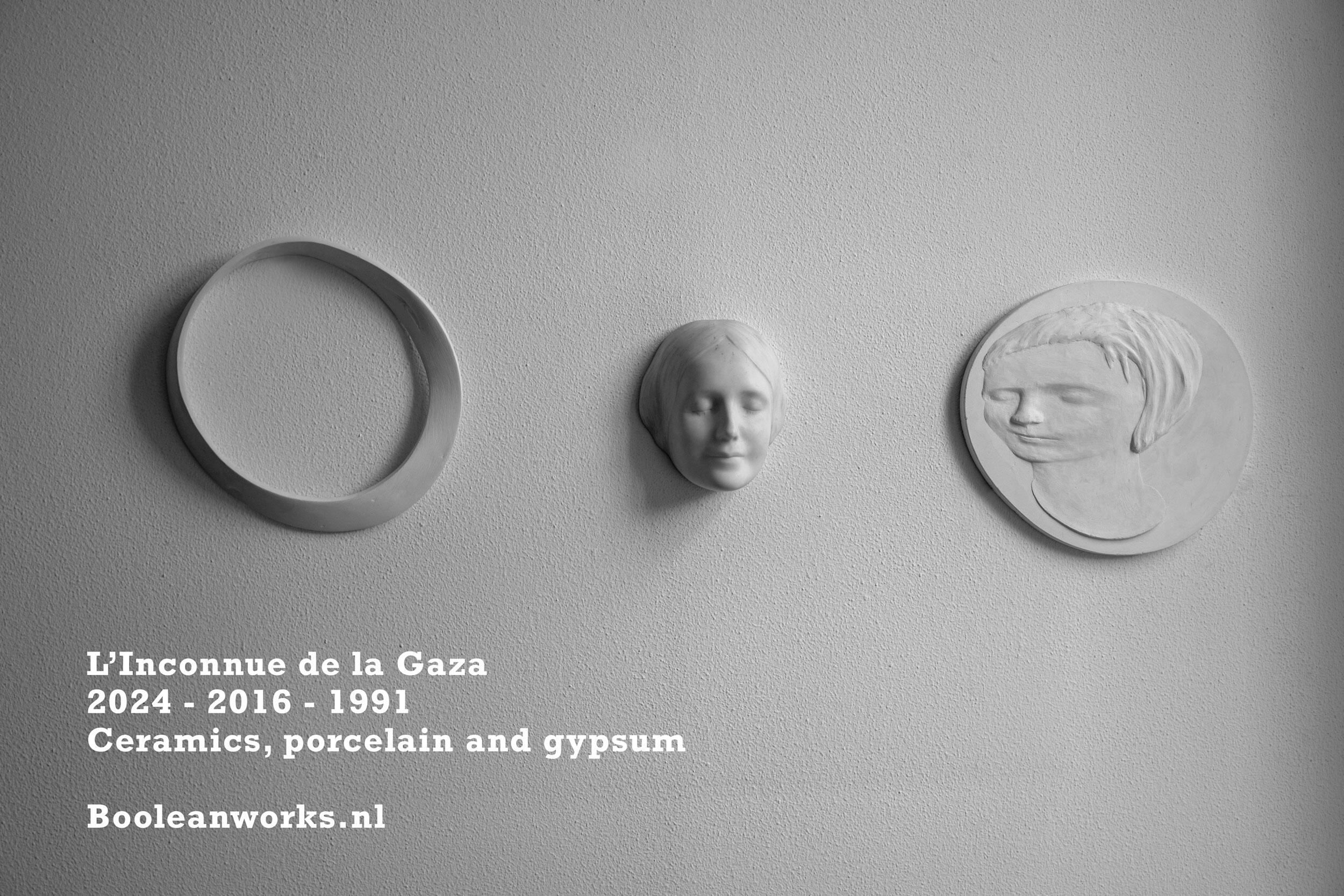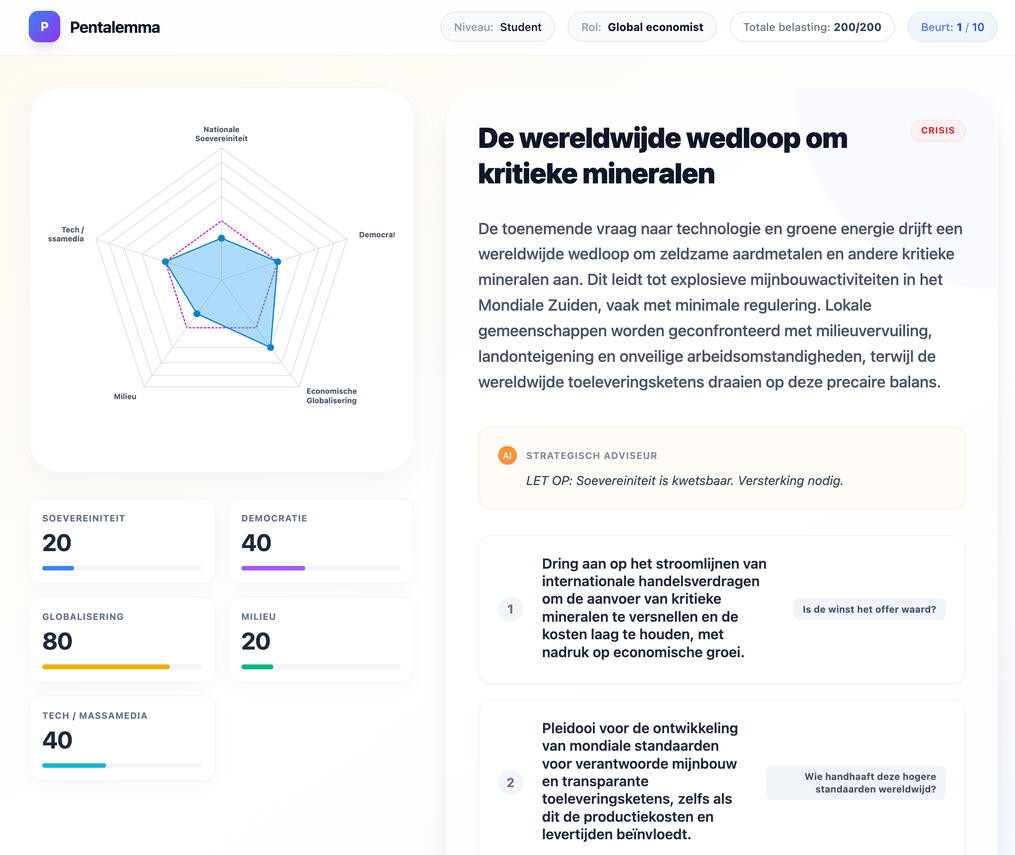


November 28, 2023, by Johannes Bongers / Boolean Works. Updates in December 2024 and December 2025.

technotlogy
ABSTRACTOnce, art and technology were lovers as poiesis and technê. In their creative union, poiesis, the process of bringing being and truth into existence, and technê, the revealing of the essence of things and the knowledge and craft of making, seamlessly intertwined, blending the artistic ideal with the purpose of the object, a being.However, over time, the relationship between poiesis and technê unraveled. As technê increasingly rationalised, embraced by the Enlightenment, the once balanced partnership shifted, leading to the current dominance of technology, science and the isolation and marginalisation of art. This rise of technology, fuelled by the exploitation and distribution of all available resources and energies gave birth to capitalism. Rationality, order and hierarchies, bounded by science, caused a tremendous chaos and atomised the individual and the collective, at the expense of creativity and agency. It has led us into a systemic collapse of our understanding of the coherence between the psyche, the social, and milieu, paving the way for monotony and violence to infiltrate every aspect of life in a cascade of crises and catastrophes. Agency, both singular and collective has evaded and left us stuck while semiocapitalism further colonises our temporalities.What ignited technotlogy?
Between 2011 and 2019, we worked on Fazzination, a counter-narrative to social media: a deep dive into knowledge and proximity. We designed a radically new architecture where the single user would always remain in control, even as part of a group or organization. However, we failed to see that the core issue lies not in building better applications, but in the flawed concept of technology itself. The deeper revelation was that, as part of the Revolution of Concepts, the very concept of technology itself must be reimagined.

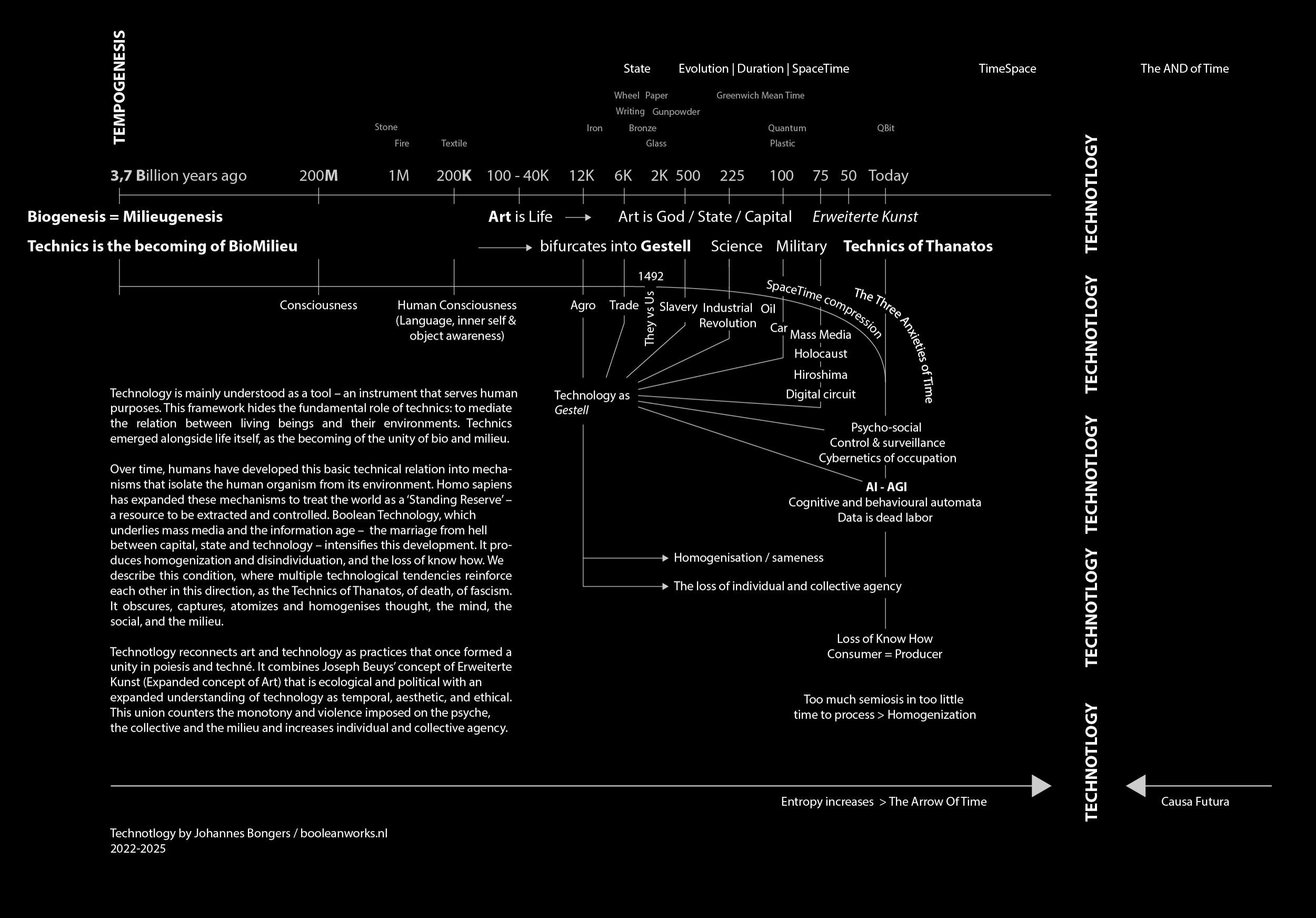

Technotlogy emerges as a transformative paradigm of time, rethinking the relationship between life and milieu, agency and creativity and art and technology. Technotlogy can be best understood as a freedom-practice bridging two expansions: the reintroduction of Joseph Beuys' concept of Erweiterte Kunst, Expanded Art, which embodies a pan-ecological and ethical and aesthetic practice, and its counterpart, a new expanded understanding of technology: Expanded Concept of Technology. This Expanded Technology builds upon the continental philosophies of time and technology and how technology has manipulated the temporalities of the psyche, the social and our understanding of being in milieu.Technotlogy introduces a new and advanced concept of time – The AND of Time – and a radical speculative concept of causation – Causa Futura – for new temporal limits within the dynamics causing the predicament.Similar to regular technology platforms, the architecture of technotlogy consists of an operating system (OS) built upon diverse theoretical and philosophical kernels, and Apps; artistic, political, and ethical projects. This architecture sustains multiple temporalities, ensuring the exchange of longevity (OS) and actuality (Apps).The technotlogy Apps form their own cosmology: a municipality and a city, a political movement, a sonic version of person, a small forest, a game, a color, or an interpretation of history. They are artworks but also organizations, bodies, compositions, sketches, and form experiments. Most apps have their own 'web-address'. The Apps span and connect different domains, and each App invites participation and contribution.Technotlogy as an evolving framework is open, is inherently relational, ethical-aesthetic, personal, antifascist and collaborative, offering a radical approach to support the increase of singular and collective agency.

Technotlogy is a non-US platform opposing the global infiltration and domination of US-centered semiocapitalism. Also in this perpective, please consider donating to one of the following organizations:Palestinian Children's Relief Fund:
United Nations Relief and Works Agency:
Middle East Children's Alliance:
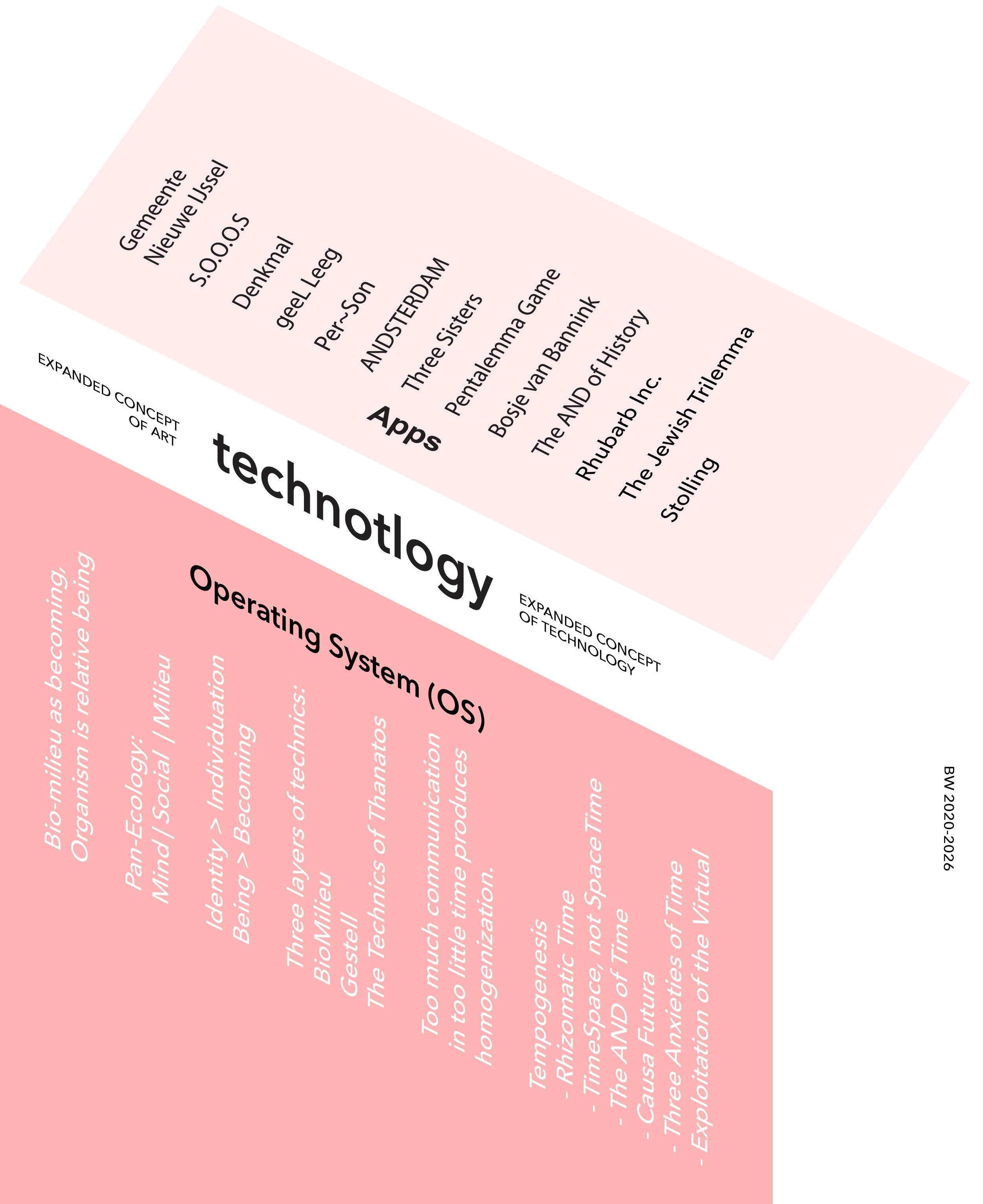



Contents
INTRODUCTION link
+ Today
++ Architecture
+++ Preview Apps link Kernels, 8's, vortices, loops & whorls link Section I: Towards expanded ecologies
1. Technology needs Technotlogy link
2. Inside / Outside asymmetry and Agency link
3. Technics as the figure 8 link
4. Gestell and Expanded Art
"The essence of technology is not technical" link
5. Expanded concept of technology link
6. Pan-Technology: Three layers of technotlogy link
7. Pan-Ecology: The Three Ecologies link Section II: "Its the logic, stupid!"
8. Towards a Boolean code-duality link
9. Excessive Communication, Time, and the Loss of Diversity link
10. Private means robbed from the public link
11. Entropy, Complexity, and Sameness link
12. Boolean Technology and the Rise of Totalitarianism link
13. Three technotlogical works link
14. AI and the Triumph of Rationality (March 2024) link Section III: TimeSpace
15. The AND of Time link
Part 1: Time is relation, not relative
Part 2: A short history of time
Part 3: The Three Anxieties of Time
Part 4: Causa Futura: the future colonizing the present link
Part 5: Causa Futura and the artist role in breaking time
16. The End of the New, a metaphysics of AI link
17. Stolling link
18. Rhubarb Inc. link - From 'ist' to 'wird'
19. "Jeder Mensch wird ein Künstler" link TECHNOTLOGY IN ACTION
+ Technotlogy OS link
++ Technotlogy Apps link COLOPHON link
Introduction
Technotlogy.com is not a commercial enterprise; it is a common good. Technotlogy offers a new concept of art and technology by reintroducing Joseph Beuys' concept of 'Erweiterte Kunst' (Expanded Concept of Art) intertwined with a new Expanded Concept of Technology.Joseph Beuys proclaimed that 'only art can change the world,' implying that the essence of humanity lies in using one's creativity and thought to shape their psychic, social and material environment. However, the once collaborative forces of poiesis and techne have now diverged. Technology, emancipated from craftsmanship and aided by science, has evolved into a technical and rational mentality. Art retreated into its shells and engages with the world from the outside, performatively. Art has become reduced to artworks and the art world, rather than being about renewing the world by using one's artistic-political potential. Meanwhile, technology's omnipresence has distorted the world and everything on it.Technotlogy is art, disguised as technology, aiming to transform the mentalities of both art and technology from the inside. The need to reverse the current situation screams for a new understanding of technology, especially since it has invaded and homogenised our minds, social structures, and environments. But alongside technology, art must also reconnect with its 'Erweiterte Kunstbegriff' (Expanded Concept of Art), where artists – that is, all of us – come into contact with their creativity. Not the creativity of the creative industry, but the kind that lies at the foundation of every person to give shape to themselves, their milieu and the world. Creativity is not production, on the contrary, it is a freedom practice.
+ Today
Before Sam Altman was ousted by OpenAI's board in November 2023, his final speech on AGI focused on pushing back the veil of ignorance and advancing the frontier of discovery. However, the board of directors found his approach too risky for humanity and fired him. OpenAI's investors, however, demanded his return. This conflict is pivotal because it reveals a fundamental inversion: what Altman framed as discovery is, in fact, ignorance, an epistemological misunderstanding rooted in the overestimation of rationality, which has led to the very crises we are facing today. Understanding this overreach is now more critical than pursuing misguided notions of progress.Technology, driven by a utilitarian rationale, has sidelined the artistic and vital impulse, funneling personal and communal energies – oil, animals, enslaved persons, women and child labor, data, social relations – into private domains and has subsequently ruined all ecologies. A.I. represents this culmination, where it has been permitted to scrape and rob the entire written and creative output of all human intelligence to commodify it. Our future potential has not only been privatised and commodified, but on top of that, this technological appropriation suppresses the diversity and potential agency of future individuals and communities.In this era, marked by political cruelty, propelled by the limits of technology and massmedia, inscribed by the horrors of mental depression induced by social media, child labor cloacked as fun, and the Palestinians facing the cybernetics of occupation, we find ourselves drowning in homogenisation. 20 political parties in Dutch parliament, 20 times sorry, 20 flavours of peanut butter, 20 streaming providers, one topic per media cycle, 20 people drown each day in the Mediterranean Sea, and (2024) 40 people bombarded and starved to death in Gaza and the Middle East each day. Against this backdrop, suffering from the decoherence between mind, social and milieu, and responding to Sam Altman's call, Technotlogy emerges to lift our ignorance by turning advancing the frontier of discovery towards renewing the world through creativity as freedom practice.
++ Architecture
Technotlogy is conceptualised as an Operating System (OS) alongside a suite of Apps. At its basis, the OS is structured around a series of foundational kernels, vectors, loops / 8's and diagrams, forming the bedrock of Technotlogy’s philosophy. The Apps, designed as aesthetic-ethical projects, aim to revitalise individual and collective agency in a world stripped of it. Technotlogy stands as a collective call to newness, inviting those who wish to explore and redefine the interplay between life, milieu, art, technology and theory. We invite you to contribute your insights to Technotlogy’s structure and to develop your own apps.

+++ Preview Technotlogy AppsThe Apps of Technotlogy are addressed in the last part of this Manifesto. To provide a glimpse, without the process, what follows is a list of the apps, illustrating the applications of Technotlogy. Links to the projects are in the descriptions.

| Boolean Works | Boolean Works presents the art, technics, and theory of Johannes Bongers. Pan-ecological applications of Post-Boolean Logic and its operators AND OR NOT. Visit booleanworks.nl. | 1991 - Present |
| ---------- | ---------- | ---------- |
| App | Description | Year |
| ---------- | ---------- | ---------- |
| geeL Leeg | The color yellow, Y=100, overcodes capitalism's sameness. On permanent display. Learn more at geelleeg.nl or YellowVoid.org. | 2010 - Present |
| Pentalemma Game | An educational, strategic, pan-ecological and political game, reengineered in 2023, to design and value the relationships and dynamics between nation state, economic globalisation, democracy, earth's crises and tech dystopia. Website at Pentalemma Game. | 2011 - Present |
| S.O.O.O.S | A triadic alarm and concept for a political movement restoring coherence between the three ecologies: Mind, Social, and Milieu. For more details, visit sooos.org (in Dutch). | 2022 - Present |
| ANDSTERDAM | A pan-ecological and relational view of Amsterdam, introducing the Boolean AND as transformative and unifying: The Power of AND. Part of ANDSTERDAM are The AND of History and Three Sisters. Visit andsterdam.nl. | 2021 - Present |
| Per~son | Persona is not a theatre mask but an amplifier. Per~son is a multi-species, political-aesthetic, and ‘relative being’ exploring sound, voice, vibration, and birdsong for political gains. More information at per-soon.nl (in Dutch). | 2021 - Present |
| DENKMAL | A pan-ecological and public artwork, transforming a folk narrative into a pan-ecological statement. Visit denkmal.nl (in Dutch). | 2020 - 2023 |
| Bosje van Bannink | In Bosje van Bannink, the photographer or agent behind this 1100-piece photowork was neither the artist as artist, nor the creative as creative, but someone without free will, "compelled" by Causa Futura to document a looming ecological and deadly disaster. Discover more at bosjevanbannink.nl (in Dutch). | 2019 - 2022 |
| Rhubarb Inc. | One local rhubarb plant, a rhizomatic species, is spreading its rhizomatic nature out over the globe through the conservation and distribution of its leaves and stalks as artworks. Visit below. | 2020 - Present |
| Gemeente Nieuwe IJssel | An open municipality for practicing ecosophy: The Friendship of AND. Visit nieuweijssel.nl (in Dutch). | 2020 - Present |
| The AND of History | Studies and works on the non-linear relationship between past(s), present(s), and future(s); sculpting in time. Visit andsterdam.nl. | 2023 - Present |
| The Jewish Trilemma and the Unholy Alliance 2025 | This concept analyses how the structure of the State of Israel relates to a new global political order. Visit joodstrilemma.nl. | Q2 2025 |
| ---------- | ---------- | ---------- |
| Fazzination | A horizontal knowledge and ideation platform offering a counter-narrative to social media, homogeneity and sameness. Fazzination was live until 2020. | 2012 - 2019 |
| Boolean Park & Boolean Proto | Studio and Studio-annex for conceptualizing through STIP | PITS | TIPS (Space, Time, Information, and People). | 2001 - 2009 |
| Boolean Fruit | Concept and exhibition design for De Appel, Amsterdam. | 1998 |
| Case Study House Omega | 11 projects on architecture, the cultural condition, identity, psycho-socio-eco-analyses, art and death. In collaboration with 100+ artists, architects and theorists. | 1997 - 2000 |
| Boolean Love | Digital artwork in public space, Amsterdam. | 1996 |


Kernels, 8's, vortices, loops & whorls
The landscape of Technotlogy transcends the traditional boundaries of life, milieu, technology, art, time, and philosophy. At the heart of its system lie the foundational elements: kernels, vectors and 8's, transcendentals, core principles and narratives that guide the philosophy and ethics of Technotlogy as an Operating System (OS) that drives Technotlogy's Apps.
Section ITowards expanded ecologies
1. Technology needs Technotlogy
For something as powerful and dominant as technology, technology structures the structuring and controls the emergence, one might expect it to exist within some form of binary opposition, like that of nature and culture. A binary that opposes, complements, or extends technology, offering a framework for critical reflection. In the absence of such opposition and deeper understanding, technology has become a 'monstre'; something that cannot be fully understood; it symbolizes the new, the unexpected, disrupting traditional systems of meaning and it surpasses human control and produces unpredictable effects. It is something that becomes visible yet remains elusive, constantly crossing boundaries. But many still perceive technology merely as a tool, instrumental and neutral.Do we need a non-technology to understand technology, as French philosopher François Laruelle suggested for philosophy, art and science? Is the absence of a non-technology the reason modern technology is so dominant and destructive? Laruelle continues: "Philosophy needs a nonphilosophy that comprehends it; it needs a nonphilosophical comprehension just as art needs nonart and science needs nonscience." To which Deleuze and Guattari responded at the last page of their last book together: "They (philosophy, art and science) do not need the No as beginning, or as the end in which they would be called upon to disappear by being realized, but at every moment of their becoming or their development."Technotlogy is something like this 'every moment of their becoming', where the No lays in the middle, as mi-lieu.

2. Inside / Outside asymmetry and Agency"To ask for the origin of life is to ask for the origin of the environment. Living organisms are inscribed in their environments much like patterns woven into a carpet. The two cannot get apart, and yet there seems to be a distinct asymmetry in their relation" (Jesper Hoffmeyer, 1998).The first two sentences of Hoffmeyer's quote, the part where life and milieu are born out of eachother – biogenesis = milieugenesis – and ‘the pattern woven into the carpet’ could be a steady basis for an epistemology of ecology. The = sign assumes this is an equal relation. But it is not. The organism is in a different relation to milieu than milieu to organism. Out of the difference between these two mutual mirrorred relations a ‘relative being’ emerges: ‘relation as being’.Technotlogy is about this 'relation as being'. And about agency (and its decline) and about technics as the most fundamental mediation between organism and milieu; agency and technics seem entangled in some strange way. These are the three key dynamics that emerge from the simultaneous and primordial birth of organism and milieu.Agency
"The two cannot get apart, and yet there seems to be a distinct asymmetry in their relation". Hoffmeyer continues: the organism is always embedded in its milieu, and the milieu is shaped by the organism. However, their relationship is asymmetrical: they are not mere reflections of each other. This asymmetry is crucial for the emergence of agency. The asymmetry arises from the boundary between inside and outside – such as the cell membrane – which separates the organism from its environment. This boundary creates a tension: the organism depends on the milieu, but it can also influence it. Through this tension, the organism defines itself in relation to its surroundings: a relative being. This process of self-describing its own relational autonomy is the foundation of what Hoffmeyer calls agency.Agency emerges because the organism interprets signals from the milieu. These signals are not neutral but meaningful, as they guide the organism’s actions to fulfill its needs. Interpretation of signs does not require self-awareness but reflects the organism’s capacity to sense, respond to, and adapt to its surroundings. The asymmetry ensures that the organism is not passive but actively engages with the milieu, transforming its environment while being transformed by it.In Hoffmeyer’s view, this dynamic interplay between organism and milieu enables life to navigate unpredictability, persist in time, and develop increasing complexity. Agency, therefore, is born from the organism’s ability to interpret and act upon its environment, driven by the asymmetry that defines their relationship.




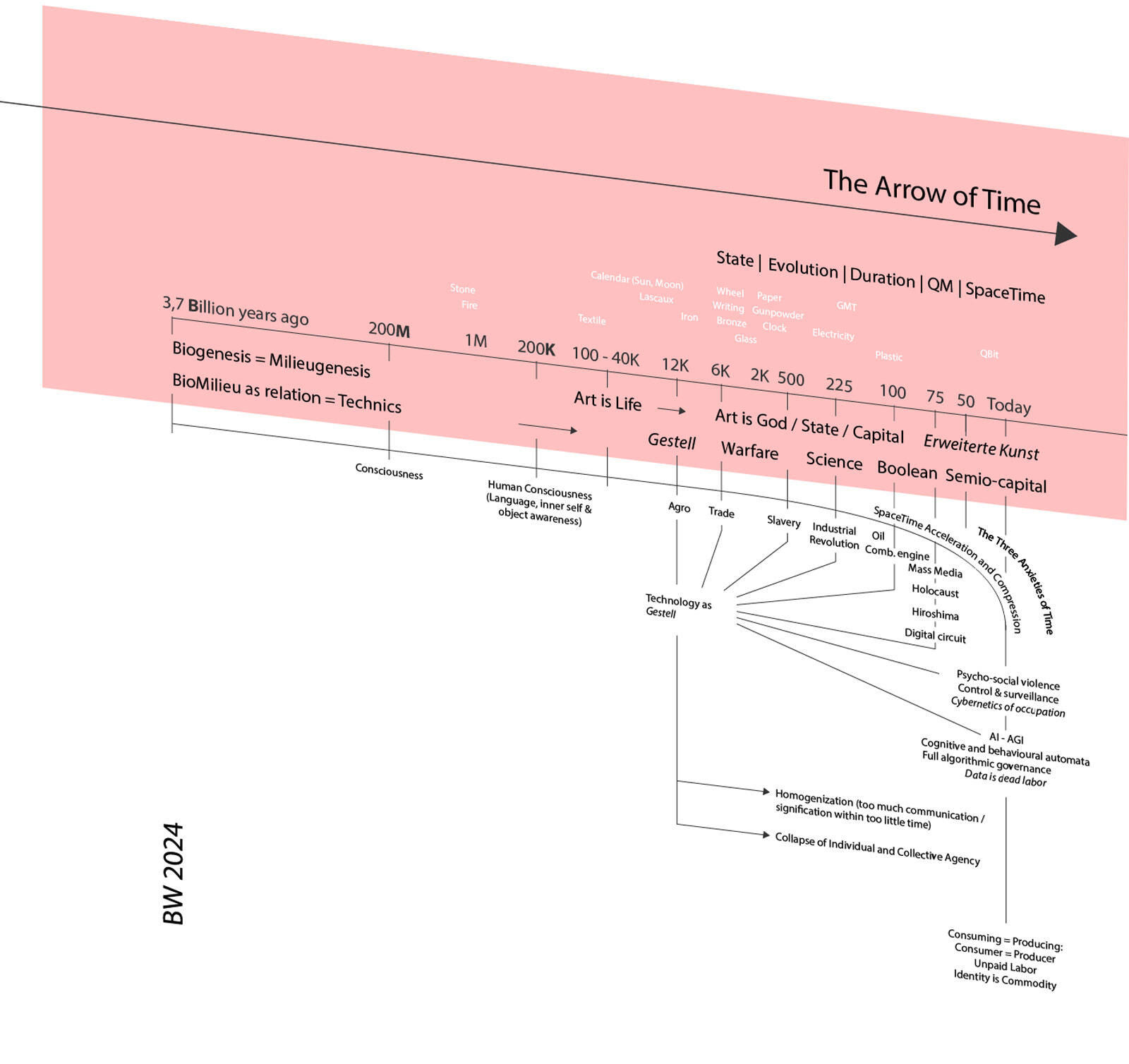
3. Technics as the Figure 8
"In virtue of their dissimilarity, perhaps a crossing, a twist, a helix, a figure 8 is even formed between the two centres." (Deleuze, Difference and Repetition, 1968)The organism and its milieu, often seen as separate domains, are born together in BioMilieu. Nurture one, and the other flourishes. Destroy one, and the other is lost.BioMilieu represents a unified process where Technics mediates the 'relation as being' – the figure 8 – between Bio and Milieu. Technics, not merely tools and extensions but knowledge and know-how, enacts this figure 8.Contrary to Heidegger’s Gestell or Stiegler’s retentional frameworks, we propose: Technology begins when life and milieu begin. BioMilieu-genesis is Technogenesis; technics is not born with human being but with the co-emergence of life and milieu.


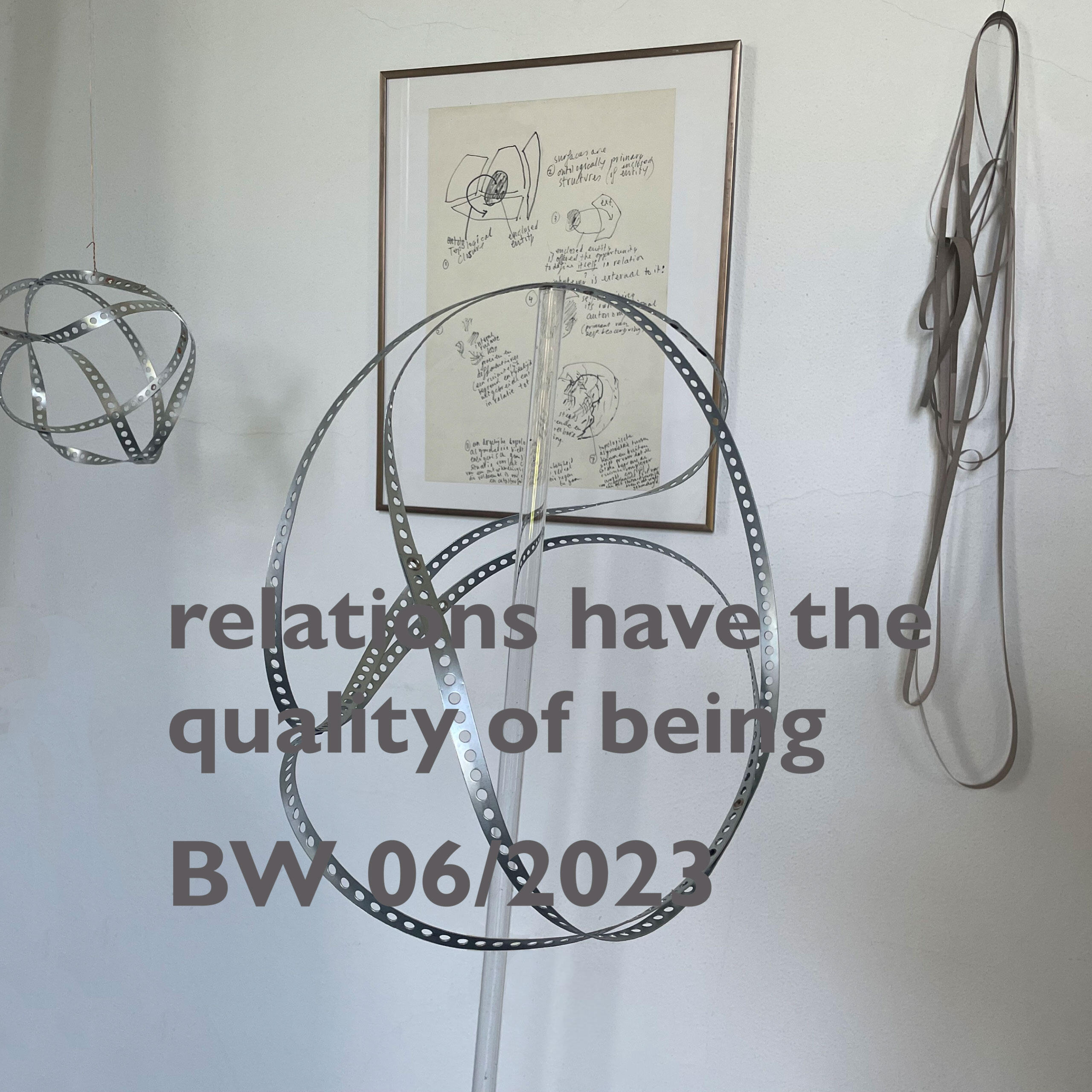

4. "The essence of technology is not technical" (Heidegger, 1954).When I first read this line, it took weeks to let it sink in. I realized how ignorant I was about the nature of technology, or rather, one nature of technology, as the philosophy of technology turned out to be divided into various schools.The 'continental school' of technology has a long history, stretching back to Plato and Aristotle, through Leibniz, Hume, and Kant, right into the modern age with Marx, Heidegger, Derrida, Deleuze, and Stiegler. This may seem academic, which it often is, as most knowledge in the humanities is not produced to renew the world. Yet the depth of these philosophical orientations is profoundly important because this elite corpus of philosophy has, at last, something serious to say about today’s predicament and how human individuals and collectives contribute to it.If the essence of technology is not technical, what is its essence according to Heidegger? ‘Gestell,’ or 'enframing' in English, is Heidegger’s term for the way modern technology and science organize and reveal the world, transforming everything into a resource for exploitation and distribution. However, the English translation 'enframing' misses the urgency contained in Gestell and the warning it conveys.The Dutch language, in which we grew up, is closely related to German. Both stellen in German and Dutch derive from the same Proto-Germanic root, stallijaną, meaning "to make stand, place, or position." Gestell in Dutch is gestel (Dutch nouns are not capitalized like in German). Gestel is composed of ge- and stel. The prefix ge- in German and Dutch signifies a 'collection' or 'gathering' of what follows. Ge-stel thus collects everything related to stellen (to set, place, or frame), as seen in be-stelling (ordering), stelling (drawer), afstellen (to adjust or tune), or opstellen (to order and to set up).Not surprisingly, if you take Heidegger seriously, these terms refer to the (industrial) processes of extraction, production, infrastructure, distribution, and consumption; to an Amazon website, its warehouses, and the production, processing, and distribution of goods. The Dutch expression alles in stelling brengen refers to wartime preparations, where everything needed for defense and combat must be organized and deployed. German goes further with stell-related terms, such as herstellen (to produce) and darstellen (to represent).Heidegger's Gestell is not merely a precise concept borrowed from language or a speculative idea. Heidegger listened to what language reveals, and with it, how people experience and construct the world. Gestell is materially related to how humans and their bodies exist within the world; Enframing is an act, Gestell is a condition.This Gestell framework dictates how entities are perceived and valued, primarily in terms of their utility, leading to the systematic exploitation of resources for human purposes. The ultimate danger Heidegger warns of is that Gestell projects itself onto the 'being' of the human being, onto the human essence itself, a warning that has not stopped the development of AGI.But Heidegger says, quoting the poet Hölderlin: "Where danger is, grows also the saving power" ("Wo aber Gefahr ist, wächst / Das Rettende auch"). Here, Heidegger refers to art, which withdraws from the rational, scientific, and exploitative mentality of Gestell. Art is the saving power. Yet, he warns, even in 1954, that signs of art bending to Gestell were already evident.To restore the transformative power of art against Gestell, in a world where art has over decades become a commodity, a market, mass media, spectacle, and lost its potential to renew the world, Technotlogy reintroduce Joseph Beuys' Erweiterte Kunstbegriff (Expanded Concept of Art) as one bridgehead of the bridge that is called Technotlogy.In 1980, Joseph Beuys was asked: Kunst kann das Leben verändern?
"Ja, Ich gehe weiter. Ich sagte: Nur Kunst kann das Leben verändern. Nur Kunst."Can art change life?
"Yes, I go further. I say: Only art can change life. Only art."
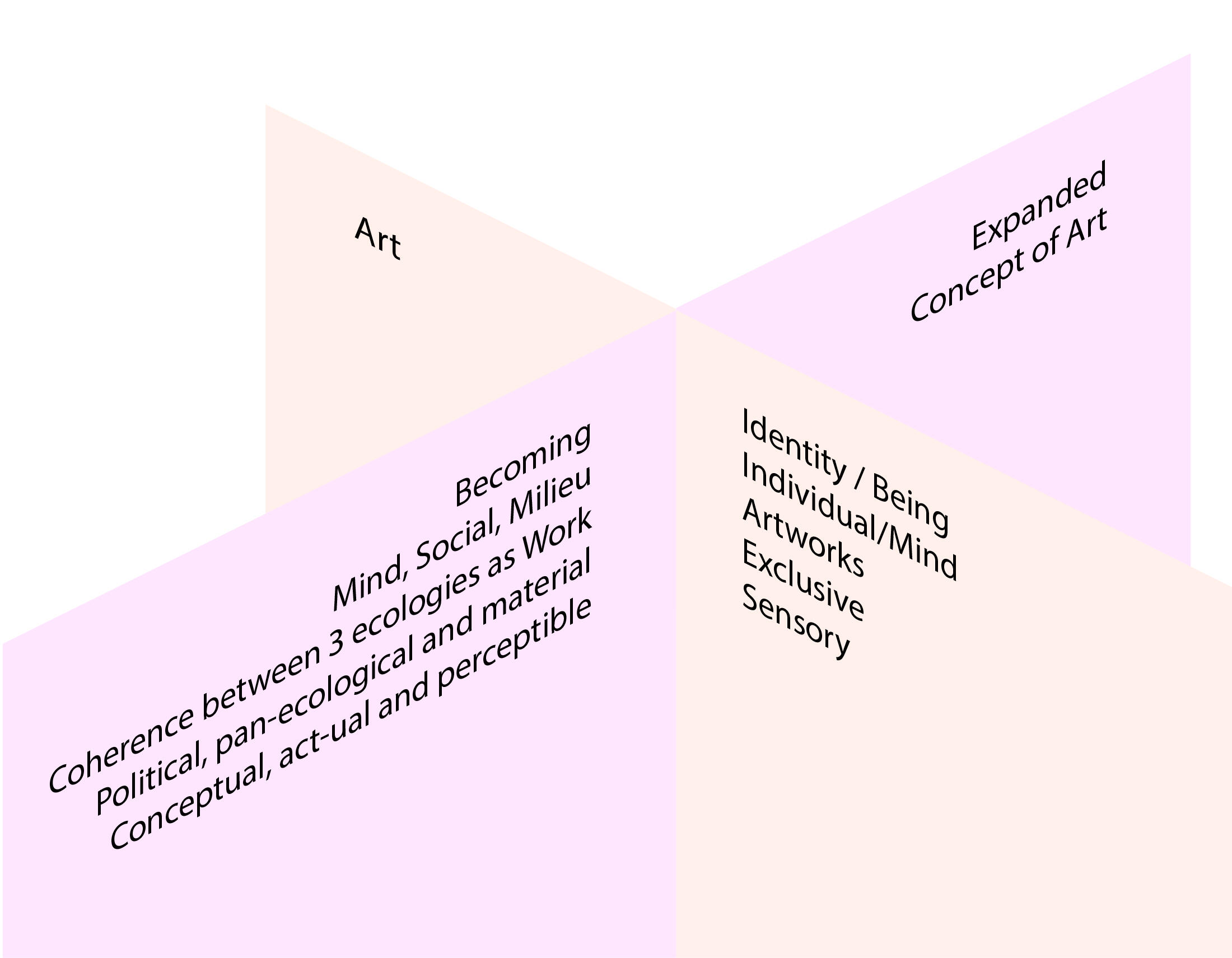

Erweiterte Kunstbegriff
By extending the concept of art to include all forms of creative, social, political and ecological engagement, Beuys positioned art as a driving force for societal transformation. The traditional concept of art, though, has proved that it lives inside a niche within human society. Modern art's design concept – 'gestaltungsbegriff' –cannot be applied by all people and to all problems that lie before us. "Creativity that is not free, is a contradictio in terminis. Human creativity is in essence a freedom practice", Beuys argued. This practice is pan-ecological and therefore critical and political, and its mentality opens the potential of art and being an artist – meaning everybody – in surprising and unforeseen ways. Technotlogy's critique on modern art goes further, art became part of the status quo, in doubling the performative act of engagement, that is cloaked as social and political, while the symbolic image/art product is a communication product to remain the status quo. Technotlogy's expanded concept of art is a 'psychic, social and environmental sculpture', which resonates with the three ecologies and our background as sculptor.Today's predicament, needs artists rather than artworks, and with artists we mean everybody. But instead of 'Jeder Mensch ist ein Künstler, we prefer the becoming nature, different from identity and stasis, expressed in "Jeder Mensch wird ein Künstler.

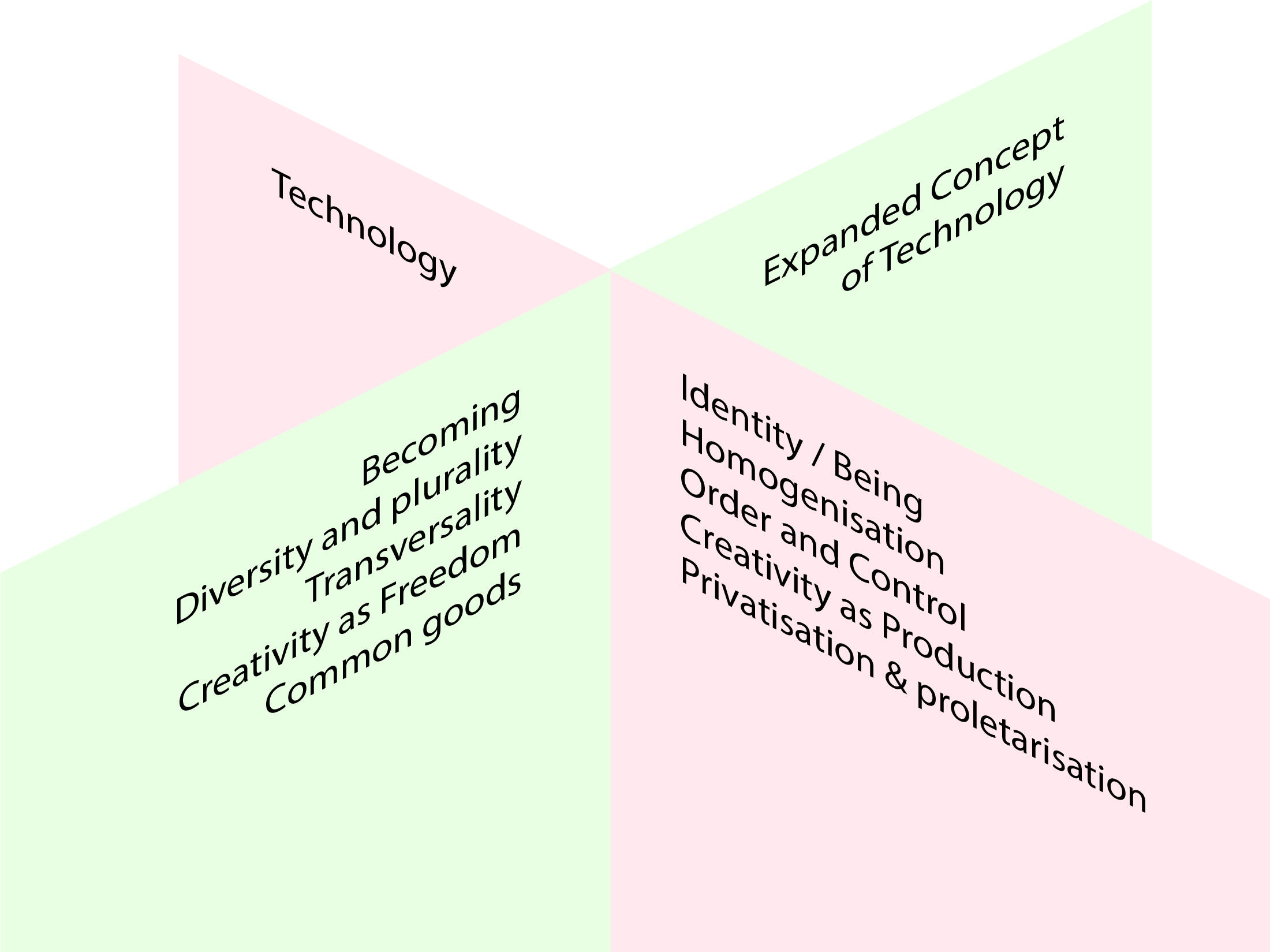

5. Expanded concept of technology
The "Expanded concept of technology" is a philosophical and operational framework that redefines technology not as a set of tools or deterministic systems (Gestell), but as a fundamental, temporal, and relational force co-constitutive of life itself."Expanded concept of technology" posits that technology (technics) emerges simultaneously with being and milieu in a co-generative process of becoming (poiesis). This process, which we termed Tempogenesis, the becoming of becoming, forms the core of a new temporal architecture.Moving beyond Heidegger's Gestell and Derrida's and Stiegler's pharmacological analysis, this expanded concept frames technology as an ontogenetic field where organism and environment reciprocally shape each other. Technology is thus inherently poietic, relational and pan-ecological.- Poietic: A bringing-forth of new realities and potentials.
- Relational: A dynamic field between bio and milieu.
- Pan-ecological: Operating transversally across mind, society, and environment.The purpose of the "Expanded concept of technology" is to counteract the Technics of Thanatos, the capitalist homogenisation and colonisation of time through semio-capitalism, bio-tech, and predictive control, by introducing a new temporal logic. This logic is built on concepts such as The AND of Time which replaces sequential past-present-future with a rhizomatic, plural temporality. Timespace, another temporal novelty, prioritizes the primacy of becoming and process over static, measured spacetime. Causa FuturaUltimately, the "Expanded concept of technology" provides the ontological ground for an operating system (OS) from which concrete projects, organisations, and artworks (Apps) emerge. The expanded concept aligns with Beuys' 'Erweiterte Kunstbegriff' in its aim to transform subjectivity, society and milieu not by producing objects, but by sculpting the very conditions of our individual and collective becoming.

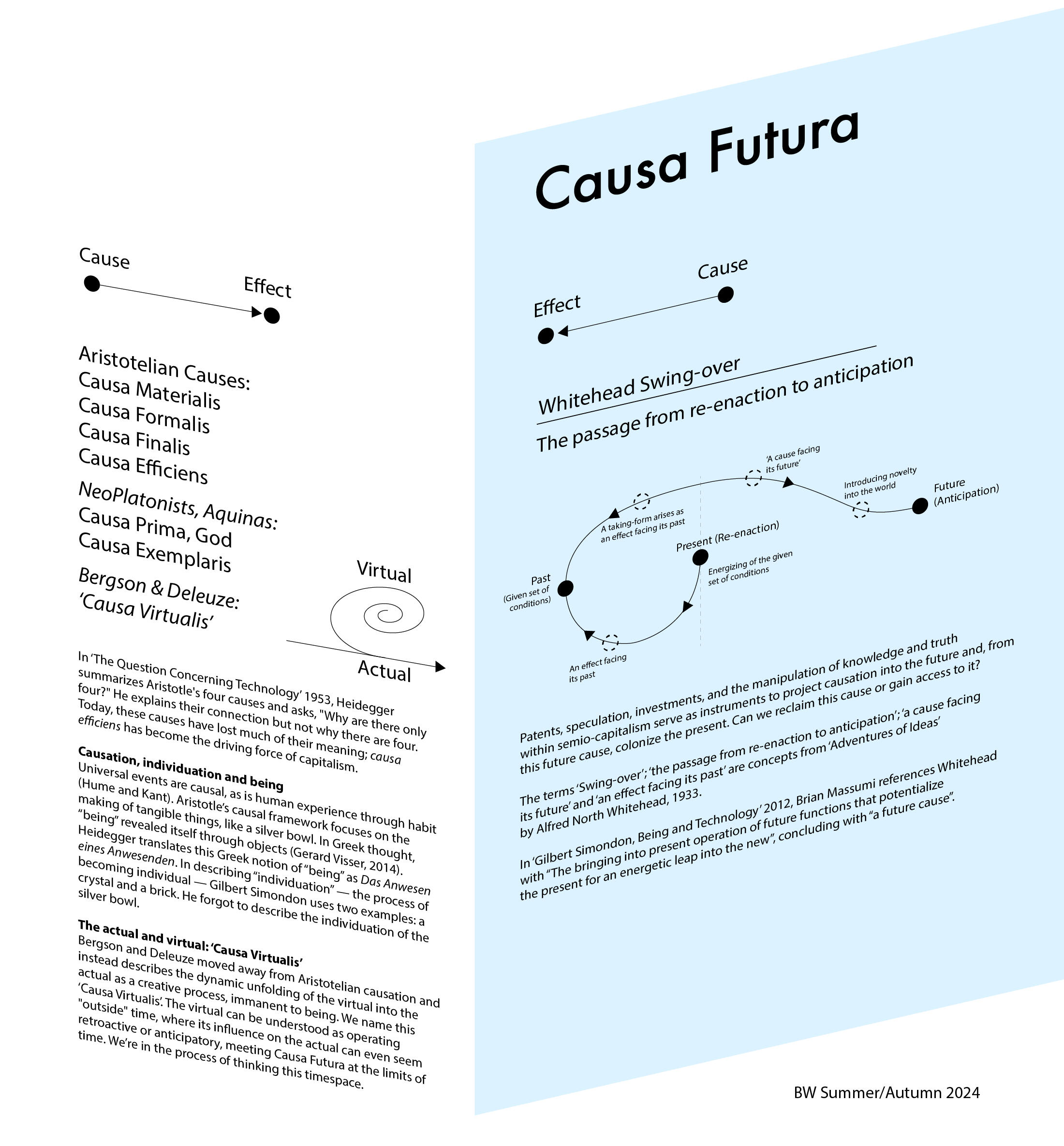
6. Pan-Technology:
The Three Layers of TechnologyPhilosophy's engagement with technology, as influential as it essence is unknown and enigmatic, evolved in the 20th century. Despite a wide range of theories, philosophers consistently focus on the one term 'technology.' In fact Aristotle used two terms, poeisis for creating the new, and techné, for the art of making and craftsmanship and know how; in our intro we suggest poiesis and techné must be understood as lovers; in fact they started of as one. Although in today's philosophy only 'technology' or 'technics' dominates, the interpretations differ significantly. Some, like Marx, the late Heidegger, Ellul, and the Frankfurt School, adopt an ontological perspective, arguing for a metaphysical foundation underlying technology. Others, including the young Heidegger, Derrida, and Stiegler, focusing on human extension, on 'technical objects,' view technology as an interplay of these objects with human activity and with becoming human. This school views technology as an extension of human capabilities, such as machines extending the body, writing expanding memory, or AI/AGI 'supporting' the mind and replacing creative and productive processes. Underlying the ontologist view and clearly driving the objectivists is the notion that capitalism either supplies the transformative energy for Gestell or accelerates the technological project.

It would be an intriguing puzzle if it weren't of the highest urgency to understand what technology 'is,' especially since we find ourselves enslaved by it. In the context of technology being ontological or functional, one must reflect: who are we, or what have we done, to ourselves and others to deserve this?Technotlogy is NOT technology
Technotlogy differs from traditional views. Different from all philosophers, and instead of the one term technology, Technotlogy identifies three overlapping strata of technological evolution and penetration.Introduction on the three layers
The history of Technotlogy unfolds across three imbricated layers: BioMilieu, Gestell, and The Technics of Thanatos, each forming a temporal sequence yet deeply interconnected in 'function'. BioMilieu (techne is poiesis) operates at the level of life and environment, grounding the relational loop that makes life and agency possible. This foundational layer underlies the natural, inseparable relationship between organisms and their surroundings, preserving the 'relative being' as described by Jesper Hoffmeyer.With the emergence of Gestell, we argue, a socio-anthropological shift occurred as human societies transitioned from nomadism to settlement. This transition instrumentalized time and space (furthering Bergson’s Time and Free Will), leading to the rise of measurement and logic that profoundly altered human understanding and self-representation. Homo sapiens began to rebuild their understanding of the world 'from the ground up,' rooted in the fixed structures of settlement. This period saw the emergence of the machine, yet the machinic did not alter our underlying relational being. Instead, the focus on technical objects diverted attention from BioMilieu's ontological base, deepening the layer of Gestell.The Technics of Thanatos, arising in the mid-20th century, marks the third layer, a convergence of science, capital, and the state. As an expression of Gestell, The Technics of Thanatos incorporates and amplifies this separation. By collecting new partners, The Technics of Thanatos forms alliances with capital and state power, evolving into planetary-scale politics. This fusion entrenches instrumental rationality and standardization, widening the gap from BioMilieu's relational core and driving humanity further from the immanent grounding in life and environment that initially sustained us.We argue that contemporary artists, working within an Expanded Concept of Art and Technology, as technotlogists, work against this death-culture.Layer 1: BioMilieu Technology
The first layer BioMilieu Technology, began with the simultaneous birth of life and milieu. The idea of organism that is separated from milieu is not supported by empirical observation, and is a result of supreme ignorance of the human organism, finally led to the rise of capitalism and today's climate crisis. "Darwin proposed a theory of natural selection and evolution in which the unit of survival was either the family line or the species or subspecies or something of the sort. But today it is quite obvious that this is not the unit of survival in the real biological world. The unit of survival is the organism plus environment. We are learning by bitter experience that the organism which destroys its environment destroys itself" (Bateson 1972). The separation between organism and environment also gave rise to the idea that technology is expressed through technical objects. In this view technical objects are needed to complement the organism, but this is leaving the environment out of the equation. Instead, organisms and their environments, born simultaneously, are one, a oneness that is asymmetrical and mediated by what we call BioMilieu Technology. A key aspect of BioMilieu Technology is to continuously reconsider what 'relation' means. This clearly resonates with thinkers like Spinoza, Hume, Whitehead, Bergson and Deleuze although they never 'materially' fused organism and milieu.Technology (technics, techne) is not a human invention but a primordial condition, inseparable from the very start of life. As soon as life emerged, entangled with its milieu, a BioMilieu came into being, a generative process of poiesis that is in essence technogenesis. This originary convergence of life and milieu, where matter and mind fold in and out one another, inaugurates Becoming: a temporal Möbius Strip that loops back into the earliest conditions of biological existence, offering the enabling matrix for agency and evolution. In merging Heidegger’s ontological inquiry into the essence of technology with Stiegler’s conception of technics as exteriorization, this equation renders their apparent differences obsolete. The BioMilieu, as technogenetic matrix, operates as the very ground of Becoming, ensuring that what we call technology has always already shaped the contours of life and its capacity to individuate and transform.Temporality over spatiality (Quotes from Jesper Hoffmeyer)Mammal-like reptiles – synapsids – appeared early in the great "Age of Reptiles," which began nearly three hundred million years ago and lasted until around sixty million years ago. By the end of the Permian, these creatures had all but vanished. Many succumbed to swift, predatory cousins that would eventually give rise to the dinosaurs. A handful survived, but only by shrinking into twilight worlds and adapting to life in the dark. Thus, the distant ancestors of present-day mammals eked out their existence hidden away from the ancestors of today’s birds. For nearly two hundred million years, our forebears were compelled to remain out of sight, lurking in a dim, nocturnal realm. It was not until the mass extinction of the great reptiles at the close of the Cretaceous Period, some sixty million years ago, that mammals finally stepped into the daylight.It was in this prolonged darkness that the mammalian brain took a decisive turn. Deprived of easy visual cues, these early mammals had to rely on hearing. Hearing is inherently temporal; sound unfolds through time rather than space. To navigate their environment, these creatures had to translate sequential auditory input into an internal spatial map. In other words, they had to weave temporal rhythms into a workable sense of surroundings. Hearing demanded meticulous timing and nuanced neurological coordination. This layered complexity imprinted itself deep into the structure of the brain. Long before the dominance of sight, mammals developed a fundamental sensitivity to time. Our deepest instincts and affective dispositions remain, even now, steeped in this temporal substrate. From the very start, we became time-bound beings.When the dinosaurs finally disappeared and mammals emerged into the sunlight, they did not simply revert to the reptilian reliance on vision. Instead, they added a new dimension—rich color perception and refined spatial analysis. As the French molecular biologist François Jacob notes, the mammalian brain integrated sight and sound, folding these signals into both space and time. But we argue that while this more complex spatial and color-based vision took hold, it merely layered - imbricated - upon the older, temporal architecture, never erasing it (according to the way evolution works). We remained, in our core, temporal creatures who now also possessed a sophisticated visual overlay. The temporal dimension, forged in darkness, continued to underlie our habit, memory and future (through Hume, Bergson and Nietzsche) and our cognitive apparatus and shapes our understanding of ourselves and the world.The temporal foundation, our original vulnerability, extends into the present. Today, social technologies and mass media do not simply address our spatial intelligence - measurement and control - they target the temporal stratum of our being, colonizing our attention and internal rhythms. They seize upon that primal layer where we are most open, most impressionable, most fearful and reconfigure our sense of duration through constant interruptions, accelerated cycles of information, and the relentless scheduling of our lives. The oldest patterns within us, those born of hundreds of millions of years of nocturnal adaptation, are now the prime terrain for a new kind of colonization, one that operates through time, infiltrating and reshaping the fundamental way we experience our existence.Once the nature of becoming as BioMilieu, as technics in temporality, leaves us today as Bio outside Milieu, in spatialized time, while technology hijacks our minds.The human organism keeps struggling operating as biomilieu poets and technologists. Though human organism have entered, triggered, new stages of technology, BioMilieu technology - as a becoming - remains foundational.Layer 2: Gestell
We argue that with the advent of agriculture around 12.000 years ago, Homo sapiens began to territorialise, to emulate the stationary nature of plant life. The departing from nomadism, being free in time and space, required a new understanding of being in time and space, differentiating time from space and separating organism from milieu. This period is marked by spatialisation - the optimisation of the human environment, the exploitation of all Umwelten began, and gave rise to 'Gestell', as Heidegger termed it. Different from Heidegger, we argue Gestell is not ontological, but epistemological, the result of surviving in a static - non-becoming - time and space. The settlement of a nomadic organism on one location uncovers the nature of spacetime. The settlement changed the organism/milieu condition, and a new understanding of the spacetime relation. It gave rise to a different experiencing of being a BioMilieu technologist, or poet, of the division of spacetime, and of the exploration of space as measurement without time, and the exploitation of the earth to harvest its potential. The organism splits itself from the milieu. Gestell is this unnatural, or new natural, exploitation and understanding of being that organism. Reason and rationality, that came with Gestell, is nothing different than dealing with this new situation. On the other hand, one could draw this moment also as "The birth of time'.Gestell, following the layer of BioMilieu Technology, is the second layer of Technotlogy. But Gestell is not the replacement but a bifurcation of BioMilieu. The deep engrained laws and unity of life and milieu continues but the understanding of the human being of its relational autonomy changes into domination. Unfortunately, what began as unity of organism and milieu in the BioMilieu technology evolved into the separation of organism from milieu in the Gestell stage. And of the separation of space and time. As it turns out, the next level of technology, Boolean technology, will colonise every aspect of time, in order to tame the human organism into production and consumption. The more the organism is abled to believe in itself, the more it becomes removed from its 'becoming'.Layer 3: The Technics of Thanatos
The Technics of Thanatos arises in the second half of the 20th century. TV, advertising, consumerism, Shannon’s information theory and the transistor introduce a mode of technology grounded in divisive Boolean operators – AND, OR, NOT – producing 1 or 0. This marks a third layer of technics that removes human interaction even further from the tangible world. What begins with commercial TV, cybernetics and automation develops into a mentality: a technics centred on instrumental rationality.The Technics of Thanatos, the technics of death, through its instrumental rationality affects every ecology. It drives economic inequality, democratic erosion, and the homogenisation of mind, social and milieu, diminishing (bio)diversity and variation. The recent rise of fascism, nationalism and extreme religion signals Thanatos.Technics of Thanatos and Necropolitics
"The Technics of Thanatos" differs from necropolitics of Achille Mbembe. The Technics of Thanatos (ToT, German for death) points at technics that inevitably lead to homogenisation, unfreedom, and states of control; conditions that hate life and the new.
Necropolitics, as described by Achille Mbembe, describes and leads to the political and spatial organization of the world through the power to dictate who may live and who must die. It is the ultimate expression of sovereignty, creating "death-worlds", new and unique forms of social existence in which vast populations are subjected to living conditions that confer upon them the status of the living dead.In essence, while Necropolitics describes the geographical and political landscapes of death created by modern sovereign power, the Technics of Thanatos describes the underlying temporal and metaphysical engine that makes such landscapes possible and increasingly pervasive. Necropolitics is the symptom on the body politic; the Technics of Thanatos, through instrumental rationality, is the logic behind it.Boolean Works
The atomistic, homogenizing and divisive impact of Boolean Technology gave birth to Boolean Works from 1991, our first attempt to connect, unknowingly, the ecologies of mind, social and milieu. With technotlogy, through BioMilieu, Gestell and the Technics of Thanatos as three entangled strata, each amplifying capitalism’s anti-vital tendencies, we arrive at today’s predicament.November 7, 2024: Trump has been reelected, supported by AI and Crypto libertarians; the fusion of social ecstacy (as religion or cult) and speculative capitalism has widened the entry of Causa Futura on the present.

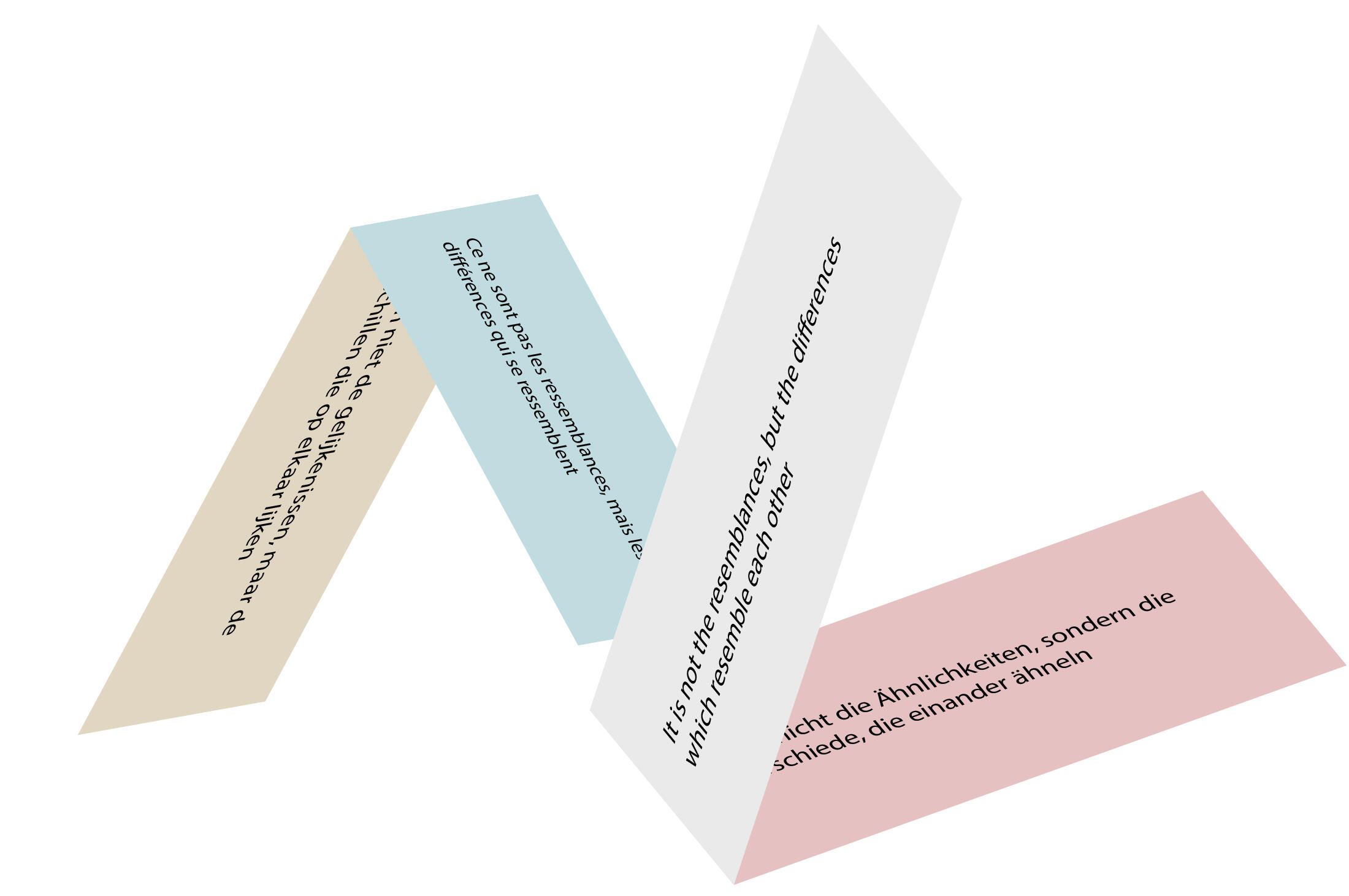


7. Pan-Ecology: The Three Ecologies"Now more than ever, nature cannot be separated from culture; in order to comprehend the interactions between ecosystems, the mechanosphere and the social and individual Universes of reference, we must learn to think 'transversally'. Just as monstrous and mutant algae invade the lagoon of Venice, so our television screens are populated, saturated, by 'degenerate' images and statements. In the field of social ecology, men like Donald Trump are permitted to proliferate freely, like another species of algae, taking over entire districts of New York and Atlantic City; he 'redevelops' by raising rents, thereby driving out tens of thousands of poor families, most of whom are condemned to homelessness, becoming the equivalent of the dead fish of environmental ecology."In "The Three Ecologies" from 1989, Félix Guattari builds upon Gregory Bateson's assertion that "there is an ecology of bad ideas, just as there is an ecology of weeds." Guattari expands the conventional understanding of environmental ecology to include the ecologies of mind and the social realm. He argues that each of these ecologies suffers under the excesses of capitalism, leading to a fractured coherence among them. This critical perspective was formed even before the advent of Boolean Technology, which specifically targets the ecology of mind through the exploitation of the social. This Boolean technology diminishes the richness of ideas and diversity, as it parasitically exploits and capitalises on social and public structures. In this context, the milieu or the biosphere, like the human mind and social fabric, is treated merely as a resource to be exploited and distributed.The crisis of the social and climate are on today’s agenda, for what its worth; the one most crucial, though, is politically excluded: the homogenisation of the human mind and the ecology of ideas and thought, the mind without which nothing makes any sense (Gregory Bateson 1972 | Félix Guattari 1989 | Bongers 1991).
Section II : "It's the logic, stupid!"
"It’s the Logic, stupid!" points to what lies beneath what is so often criticized today: social media, AI, and the endless chain of platforms and systems driving negativity, polarization, misinformation, addiction. These are symptoms though, not causes. Beneath their surface lies the logic that shapes them: the logic of extraction, optimization, and control.
8. Towards a Boolean Works code-dualityThere is a common perception that digital technology is characterised by the binary language of zeros and ones. However, this view hides a more complex issue. Often, what is assumed to be the cause is merely an effect. It is not the digital per se that should be our focus, but rather the underlying logic that leads to digital technology. The nature of this logic, rooted in Boolean algebra, is seldom discussed.Boolean logic, developed through historical milestones, from Aristotle’s early explorations to Leibniz’s Universal Language, and Claude Shannon’s 1937 thesis that paved the way for the transistor, has evolved. What began as a philosophical and mathematical inquiry, an odyssee towards a true logical world, now underpins the information age and forms the DNA of its dystopias. Our argument is that Boolean's fundamental operations, AND, OR, NOT, through intersection, union and complement leading to inclusion, exclusion and negation, cut much deeper, and is intrinsically divisive, than the resulting binary division of Boolean True/False, 1 or 0, driving wedges in our relational understanding of the world, our bodies, minds and the fabric of society. This perversion of Boolean logic serves to divide and diminish, reducing complex identities and relationships into simplified, consumable categories, turns becoming in the stasis of identity and being. The logic of the technological dystopia is inherited from Boolean Logic. At Boolean Works (since 1991), we challenge this mathematical distortion, embraced by tech and missed by theory.Before starting Technotlogy, we sought to uncover how Boolean logic, in such a short time, triggered a digital dystopia that has infiltrated our minds, societies, and physical world. However, we were unaware of the depth to which philosophy was also grappling with this. We argued that Boolean Technology and its DNA is troubling precisely because it amplifies this human shortcut, a triad logic producing a dualistic framework, that fails to capture the actual complexity of reality and nature. Its logical algebra and operators – inclusion, exclusion and negation – are deeply inadequate for representing the richness of complexity and creativity of life processes. This limitation have become evident in how today’s technology distort our minds, collectives, life, love, and work. Regulation cannot address these distortions; maybe designing a new logic like code-duality, as we are exploring in Boolean Works (since 1991), or as Technotlogy, as art, maybe can serve life.Code-duality by Hoffmeyer/Emmeche
Above we wrote how Hoffmeyer argues that the origin of life cannot be separated from the origin of its environment. Life is not just a collection of isolated properties but a system of relationships with its surroundings. Life depends on an inside/outside asymmetry. This boundary enables life to maintain itself, resist entropy, and grow in complexity by interacting with its environment.For life to persist over time, it requires two complementary ways of processing and storing information what Hoffmeyer and Claus Emmeche call code-duality. The first is analog code, which involves continuous, real-time responses to environmental changes, such as how an organism adjusts its form or behavior to survive. This type of information is fluid and directly tied to the organism’s immediate context. The second is digital code, which encodes stable, rate-independent information in genetic material like DNA. This digital encoding allows life to preserve knowledge across generations, creating a durable memory that remains accessible even when environmental conditions change.This dual system, analog for adapting in the moment and digital for long-term stability, gives life its remarkable ability to persist and evolve. It enables organisms to develop agency, and the capacity to interpret environmental signals as meaningful signs. These interactions are not predictable or determined by fixed laws but emerge creatively and contingently, responding to novelty and unforeseen circumstances.Hoffmeyer emphasizes that the asymmetry of life’s boundaries is not just physical but also temporal. Life uses these boundaries to balance the immediacy of analog change with the permanence of digital memory, allowing it to anticipate and adapt to future needs. This interplay between the two codes is essential for life’s survival, making living systems active agents in exploring and shaping their environments.The Boolean Logic of inclusion, exclusion and negation and the digital 1/0, the "uni-code" based on Boolean logic – this crude and poor framework – is all technology today depends on. Previous theorists, in the early days, like Von Neumann, introduced code-duality too. But this analog and digital formed the 'digitized automata' integrating analog systems handle immediate, dynamic changes (sensory input) while digital systems provide long-term storage and symbolic manipulation (like stored programs). While biological systems maintain equilibrium between analog responsiveness and digital memory, technology has over-prioritized digital, symbolic systems.Life-sciences demand code-duality to counter the reductionist narratives of theorists like Richard Dawkins. Yet technology, fully aware of its dystopian enterprise, remains silent. Is it lack of imagination, or does the uni-code reflect a mental and social state where coding has devolved into typing, not acting? As an example, Technotlogy is a process of both typing and acting, OS and Apps, digital and analog, techne and poiesis.Over the decades, in Boolean Works we learned to interpret the Boolean operators AND OR NOT differently to deconstruct the digital and its inherently dividing, excluding and negating nature: AND as the synthesis within diversity, OR as the expansion within unity, and NOT as the critical edge that fosters, rather than forecloses, transformation. In other words, AND unites amidst diversity, OR diversifies within unity and NOT brings clarity from opposition. It may not come as a surprise that, over time, the AND, as shown in The AND of Time, The AND of History and ANDSTERDAM, represents the analog and is influenced by the thinking of Gilles Deleuze. The OR fits, i guess, with the philosophy of Alain Badiou, where it represents discreteness, decisiveness, exclusion and decision-making, and his fascination for set theory aligns Badiou with the digital. In the art, technics and theory of Boolean Works the NOT has long represented absence and death, in one word Blanchot, but later Hegel's negation took over, while now NOT is in the heart, in the middle, mi-lieu of Technotlogy. Apps and OS, acting and writing, analog and digital are not in opposition but are in movement, evolving and open for novelty. Moving away from a technosphere of stasis and violence, to one of manifold, vitality, diversity and becoming.

9. Excessive Communication, Time, and the Loss of Diversity
"It is a paradox that diversity, being a creation of communication, can also be destroyed due to excessive communication. Indeed, communication makes Umwelten more similar to each other. Or, in other words, too much communication can be described as a general reason for many ecological problems that lead to homogenization of the world and loss of diversity. This is the case both in biological communities and in cultures" (Kull, 2005, Kull/Maran, 2014).At our request in 2022 to elaborate on his own passage biosemiotist Kalevi Kull wrote back:"A simple example is from linguistic diversity. Until the 19th century, the number of different languages as well as dialects in any country was seemingly in the maximum in the all history of humankind. After that, long-distance communication and tourism (another form of communication) grew enormously. A result was at least ten-fold decrease in number of languages and dialects.No language, no any semiotic system is closed. This means, for their life, for the diversity, communication with neighbours, with other, is necessary in some extent. New views, other languages, other ways to express are the source of creativity and innovation to any culture. Until certain limit, it increases diversity. But the increase in diversity is a slow process and requires peace; it is a tendency in case of peaceful life and development.The decrease in diversity as a result of excessive communication includes not only spoken languages. The spatial diversity decreases due to mixing, and due to the attempts to adjust one’s behaviour with the one with whom it communicates. (It also decreases, of course, in case of violence and wars.) Once tourism grew, the hotels that initially were designed as following the local traditions of design, became more and more similar over the world as a result of pressure from tourists to fulfil their needs everywhere in the way as they have accustomed. Stepwise, the many types of meals were turned more and more into the same soup in all corners of the big pot. That is globalisation, and the reason for globalisation is precisely too much communication. Communication is semiotic process.Social media, truly a communicative system, is a good example of how too much communication contributes to the loss of diversity and homogenisation".

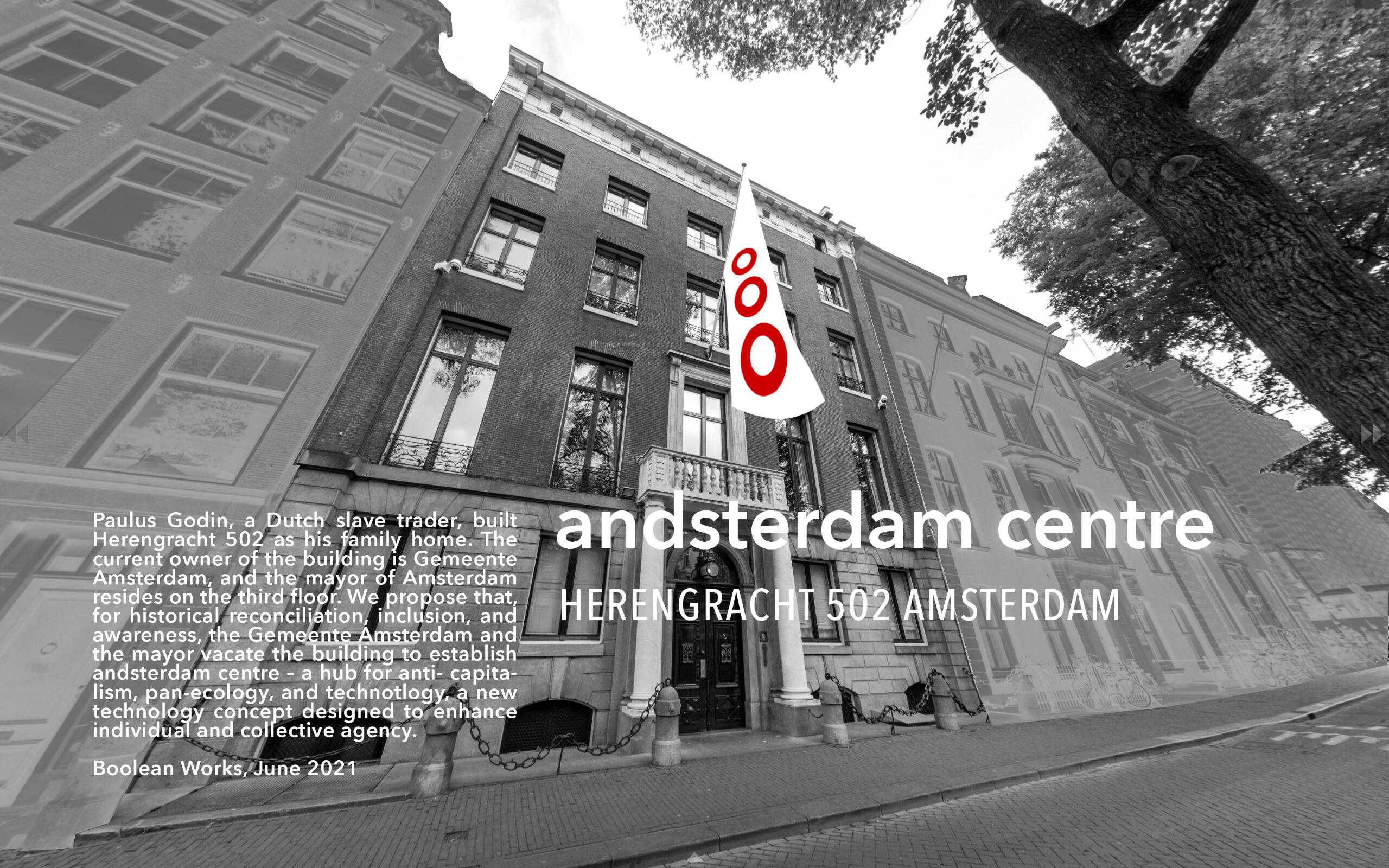
10. Private means robbed from the public
In Latin 'Privare' means to rob or steal. During Roman times, the public space in rural villas dominated the house over the family space. Later, the family occupied (robbed) the public space for their own use. A similar robbery of common goods took place in the Industrial Revolution, accelerated by a technical mentality. Just as with Earth's exploitation and the 'privatisation' of human labor, much of Boolean technology has appropriated public resources for private profit. AI/AGI, owned by tech moguls, is harvesting and scraping the ecology of mind, capturing all ideas and thoughts ever published and shared. Data is dead labour. It reflects the same strategy that Silicon Valley capitalists, like Peter Thiel and A16Z and others, used to harvest the richness and potential of global collective communication – social media – to bend public opinion and politics, homogenising human creativity and vitality into conflict and hate. Privately owned Boolean Technology parasitises common energy (Bongers, 1993 - 2023).

11. Entropy, Complexity, and Sameness
Entropy always increases, complexity comes and goes, and sameness grows under capitalism (Bongers, 2021).

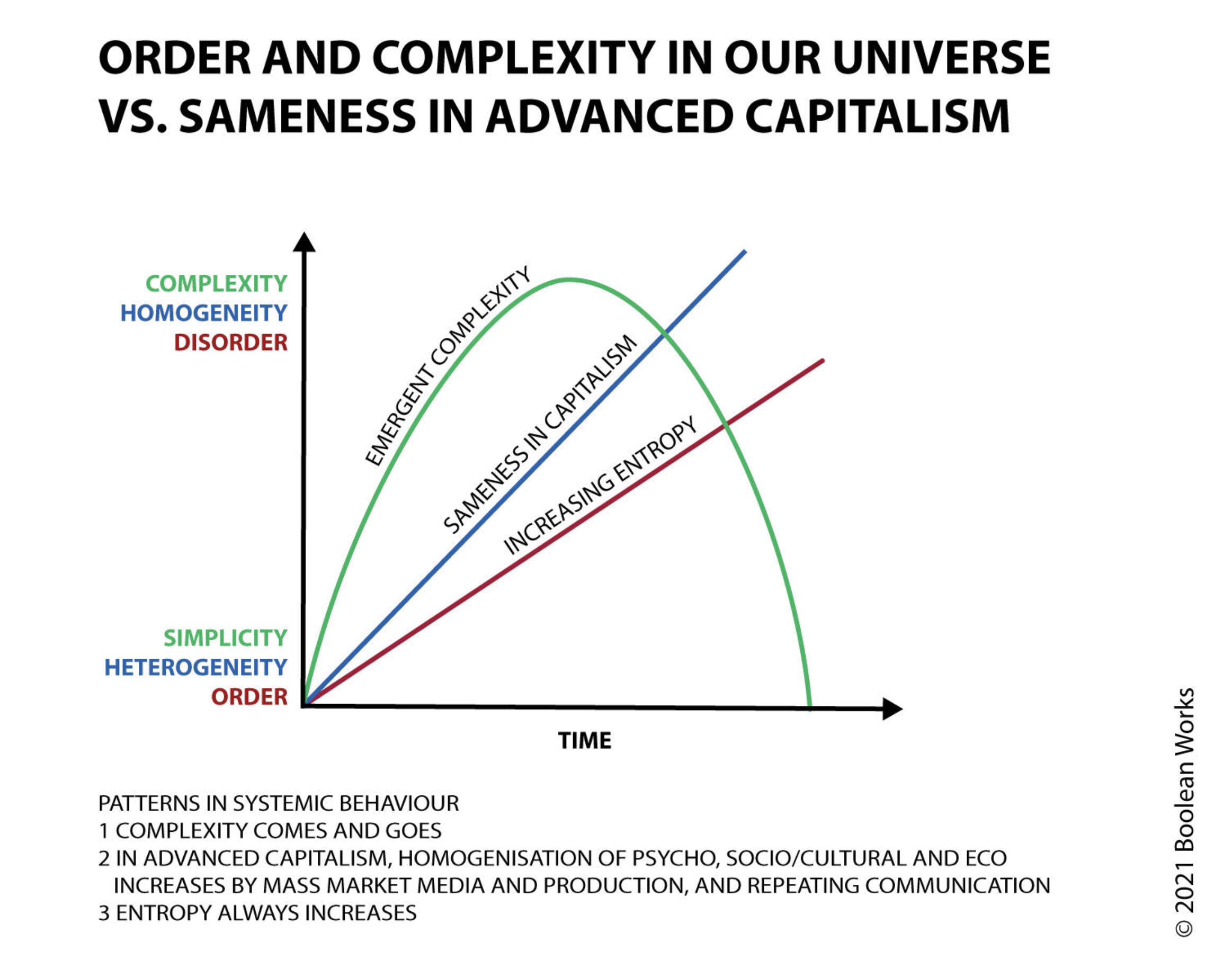
12. Boolean Technology (part of The Technics of Thanatos) and the Rise of Totalitarianism
"The group must not be the organic bond uniting hierarchised individuals, but a constant generator of de-individualisation” (Foucault 1977). This antifascist call has been negated by Boolean Technology. Boolean technology, with its divisive logic and as a force of capitalism, energises the group to confine the individual, leaving them atomised in solitary identity. Boolean Technology has equipped the group with tools to individualise individuals, similar to how radio and film contributed to the rise of Nazi Germany, successfully erasing the essential rule Foucault offers, thus paving the way for herd mentality. Observe the developments in the USA, Hungary, India, and now in The Netherlands, where the herd mentality governs. Foucault's anti-fascist call resonates with the biosemiotic perspectives of Maran, Kull, and Hoffmeyer, bridging a vital gap between biology and the humanities.February 2025, The Technics of Thanatos is at the centre of Trump 2 US politics.

13. THREE TECHNOLOGICAL WORKS

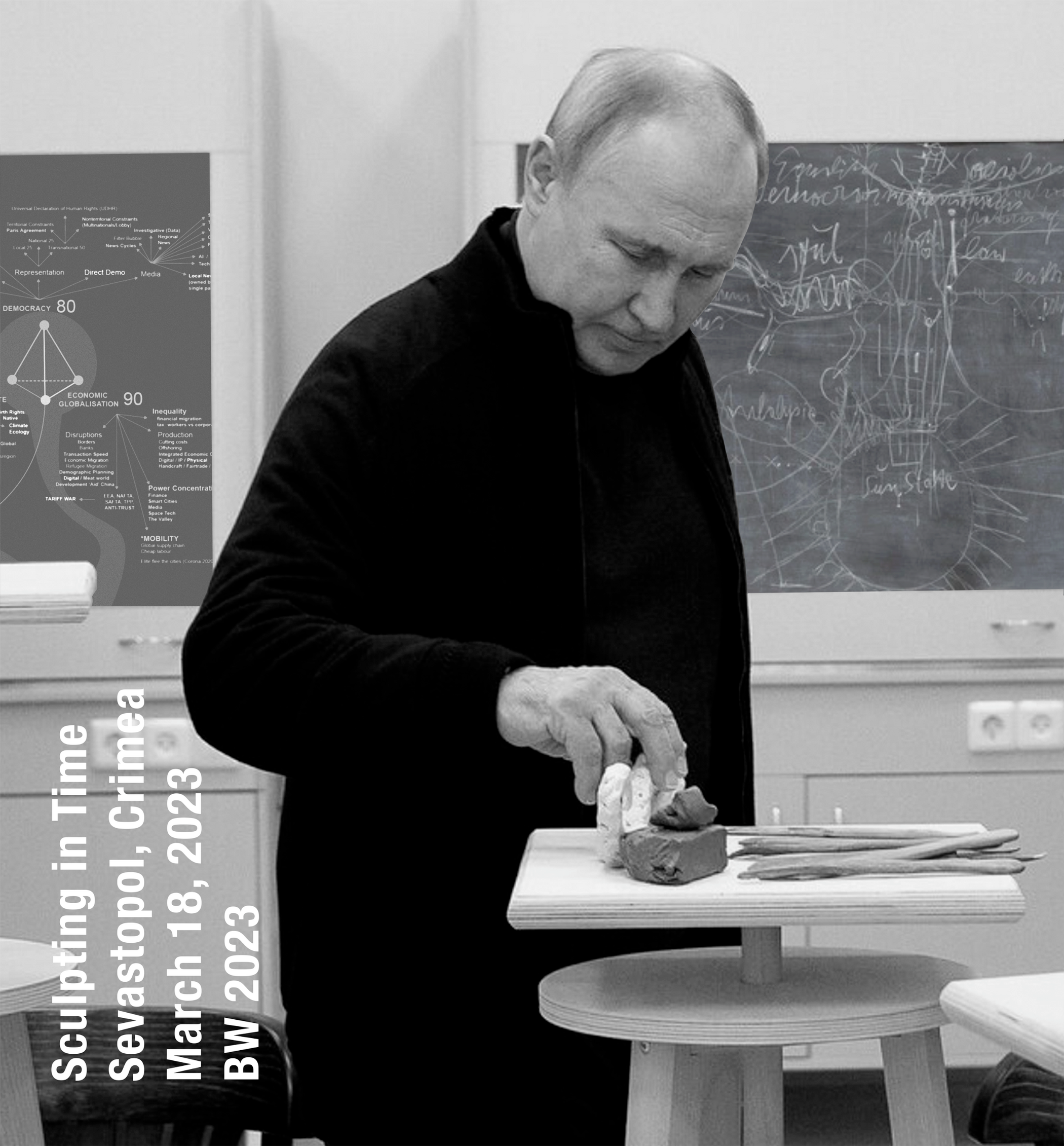

'Sculpting in time (Putin)' explores the concept of rhizomatic time. It connects psycho- and psycho-social temporality and the temporal dimension of politics and history. 'Sculpting in time (Putin)' contains different elements, including a 1974 blackboard by Joseph Beuys, the social sculptor and former German World War II pilot. Beuys' work is influenced by a personal narrative from his war experience, claiming to have been rescued by Tartars in Crimea, a narrative that disrupts traditional historical accounts. Alongside this, there's the diagram from the Pentalemma Game created 2011-2024, project by Johannes Bongers: How can fascism be avoided. These two elements provide a spatio-temporal and political and technological context for the early work of sculptor Vladimir Putin in a school in Sevastopol, Crimea, during the early stages of Russia's invasion in Ukraine.


In ancient mythology, fire was given to human beings by Prometheus. When every living creature had received its share of skills and nothing remained for humans, Prometheus entered the workshop of the gods Hephaestus and Athena – the Stoa architecture of glass tubes, steel wire and fire photos – and stole fire and technical knowledge for humankind. This theft marks the origin of human technics. In Bernard Stiegler’s reading of this myth in Technics and Time, 1: The Fault of Epimetheus (1994), the theft of fire shows that humans are defined by technics from the very beginning. Behind the glass architecture, a gray wall of high-voltage transformers hums with brute power and potential. (Bongers, 1992)


Pentalemma game is an educational political game about how to balance the five (penta) political ideals that steer and propel today's biggest crises; the crises of climate and biodiversity, social and economic inequality, democracy's legitimacy crisis, and the dystopia of technology & communication. The game is adaptable for a diverse range of users, such as local citizens, pupils and students, policymakers, NGOs, social designers, economists, ecologists, politicians, media theorists, or political philosophers and philosophers of technology.

visit app.pentalemma.com

14. AI and the Triumph of Rationality (March 2024)At the heart of the annual GTC event by AI chip giant Nvidia, where all facets of the AI industry converge, the number of participating sectors has now become countless. Nvidia's market value has taken a breathtaking flight, increasing by 60% in just a few months, surpassing the dizzying threshold of two trillion dollars and still rising. Also, at the opening of GTC24 this month, just like in other years, a massive black hole looms large, with CEO Jensen Huang standing small below on stage. On the back wall, texts unfold, all in lowercase letters, projecting with the allure of an intergalactic message à la Star Wars. "i am visionary, i am a helper, i am a transformer, i am a trainer, i am a healer, i am a navigator", and then, subtly and almost casually from the sidelines, as if wrestling itself from the shadows of the stage, "i am ai". The opening of GTC24 turns out to revolve entirely around this last proclamation, "i am ai". This palindrome, this mirror image of itself, represents the loop of being; the entity that declares itself to exist by uttering these words. i am ai, I am artificial intelligence, however, is the mirror image and successor of Descartes’ “I think, therefore I am”. This statement departs from human reason, thinking, from which ‘being’ and subjectivity is derived. The preceding 'i am' declarations illustrate the diverse applications of AI, the versatile roles under which technology is generally understood. Helper, transformer, trainer, healer, and navigator – each embodies the supposed functions of technology: instruments that support, that improve. But with the final "i am ai", AI itself takes the word, no longer just a means to an end, but as an entity in itself.In a surprising manner, "i am ai" resonates with the essence of technology as described by Martin Heidegger in 1954 in his 'Question Concerning Technology'. Heidegger warns therein of the true danger of technology, not so much in technological progress itself, but in how modern technology, hand in hand with science, turns against the essence of human being – the 'am' in 'i am'. Technology is not something positive with sometimes a negative effect, but foremost an expression of human reason: everything functions. This reason has turned against us, reflected in the cascade of crises and catastrophes we cause, and has been able to infiltrate the body, our minds, the social, and facts and truth. The order that the Enlightenment was supposed to bring has turned into global chaos. The tragicomic thing is, because humans think they are rational, and seem to have nothing else at their disposal, they must become more rational, function better and better, even into the artificial version of themselves, into AI.Where technology has so far been seen as a tool or application, with the human being itself bearing the responsibility to set limits, Heidegger's foresight from 1954 – often misunderstood as techno-pessimism – reveals a prophetic truth, the "i am a visionary" from the beginning of the GTC24 opening.
Another but even more fundamental critique of reason was given ten years earlier by Adorno and Horkheimer in their ‘Dialectic of Enlightenment’ from 1944, to which they added the chapter ‘Elements of Antisemitism’ in 1947. As Jewish-German thinkers who fled from the Nazis, they experienced ‘the rear side of reason’, and the associated rational technology, firsthand. Sociologist Zygmunt Bauman makes painfully clear in ‘Modernity and the Holocaust’ from 1989, that the Holocaust could only take place in a modern, reasonable, and bureaucratic society. “Zygmunt Bauman thereby brings the 'unthinkable' horror uncomfortably close,” wrote Arnold Heumakers in 1998. American historian Daniel Goldhagen, who describes the psychological cruelties of the Holocaust in detail and the German aberration, a book from 1986, “keeps the Holocaust at a distance”, Heumakers wrote. Human reason and modern technology form the dominant reading direction of the palindrome that, read from the other side, hides a human to which we can’t seem to gain access. It is indicative of the fate of a thinking human, who sometimes also wants to act and take action, that Heidegger saw through technology, and also ‘Being’, but that his membership from 1933 to 1934 in the Nazi party NSDAP, as a university administrator, and his antisemitic notes thereafter haunt his legacy to this day."i am ai" proclaims that the human ideal of logic and reason pursued by thinkers and mathematicians like Aristotle, Leibniz, and Boole, and which through the information technologist Claude Shannon and the transistor was reduced to a binary world of zeros and ones, has become reality in 2024. The ultimate dream of logical algebra, where logic, reason, and mathematics converge, has been realized. The Enlightenment Festival, which began in the 17th century with Descartes, reaches its culmination today; humanity has reached its destination. While the reality of AGI still awaits us, and the boundary between AI and AGI remains vague, the era of AI has indeed dawned. Google's recent warning to the Netherlands – not to lag behind in the AI race – and the call from Dutch entrepreneurs to the politicians to immediately allocate resources for applications, underline the momentum now felt. Mark this period as the moment when capital finally sold out the human project. The lack of individual or collective outrage at this heist suggests that the project had already reached its end.Does this explain why philosophers and scientists, including those from the social sciences and humanities, university administrators, and politicians, all heirs to the millennia-long pursuit of human reason, once believed to be our most distinctive trait, remain silent? One might have expected them to be raising their glasses at the grand finale of the Enlightenment Festival, marching in a jubilant procession to celebrate “i am ai”, the ultimate triumph of rationality over itself.Johannes Bongers, Gendringen, March 22, 2024.

Section III : TimeSpace
15. The AND of Time
The And of Time is a concept we developed after studying The Three Syntheses from Gilles Deleuze's 'Difference and Repetition' based on prior work of Duns Scotus, Spinoza, Kant, Hume, Nietzsche, Bergson, Whitehead and Simondon. Firstly, The AND of Time is our manifolded answer to the folk concept of time, in which time doesn't reflect the processive nature of time, and more importantly hides the productive nature of time. Think of how the 'Self' and the 'I' are effects rather than causes of temporal processes. The AND of Time seeks to illuminate how technological interventions not only modify temporal experiences but fundamentally disrupt the temporal syntheses that underlie subjectivity and collective identity formation. By recognizing the multiplicity and the interactive nature of different temporalities, we better understand how technological impacts go beyond mere interference with cognition or social interaction – they reshape the very conditions under which these cognitive and social processes unfold. In this way, The AND of Time provides a framework to critically evaluate the implications of living in a technologically saturated environment, urging a reconsideration of how technologies shape not only the present but also the continuum of past and future possibilities.The first part of The AND of Time, Time is Relation, not relative, is a sketch of a philosophy of time. This section is hard and still under construction. The second part 'The Three Anxieties of Time' zooms in on how the traditional concepts of time, as time it is commonly understood – past, present and future – are manipulated under semio-capitalism. The third part, 'Causa Futura' has been added to Technotlogy in October 2024.
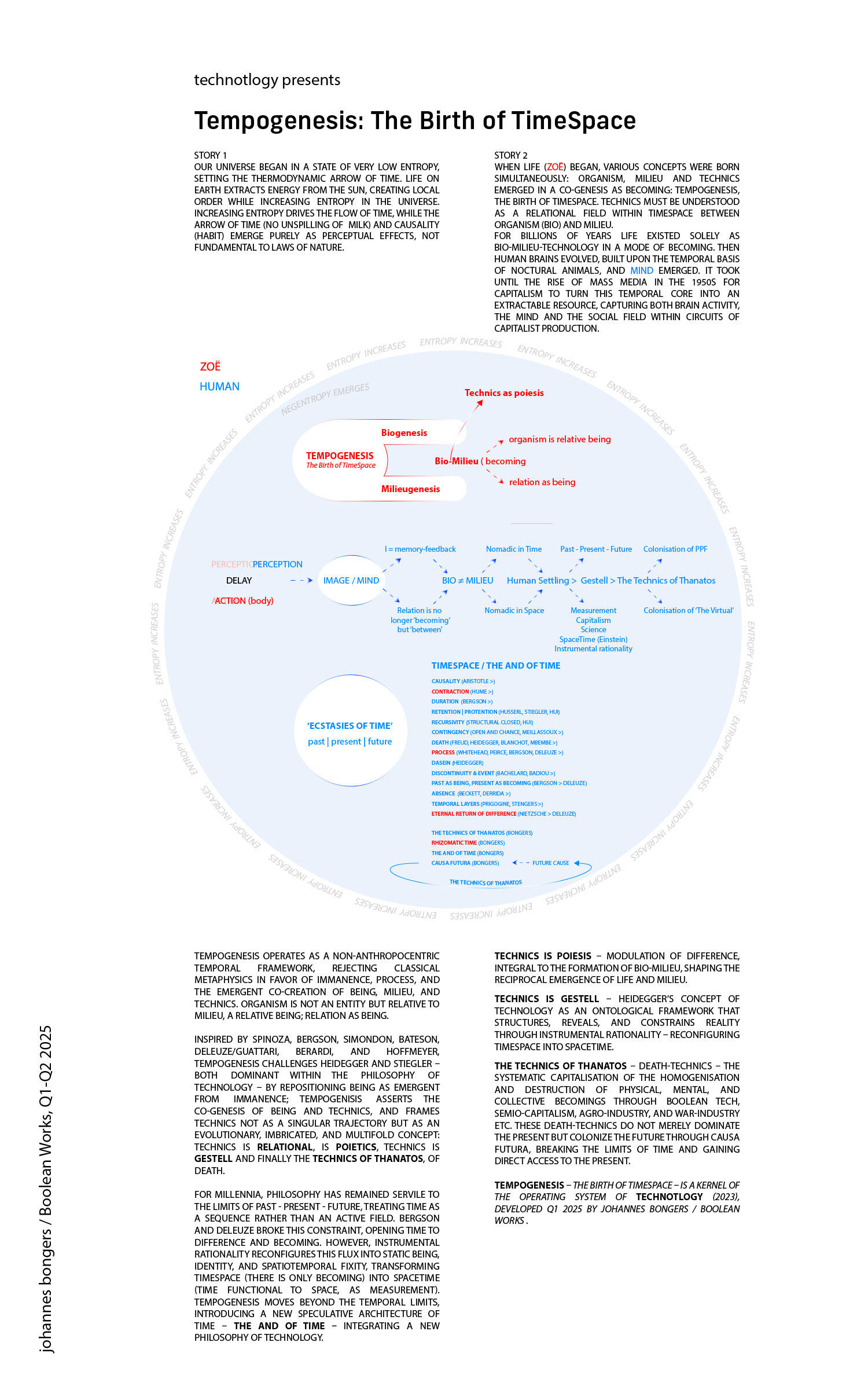
The AND of Time 1:Time is relation, not relative
From 2018 we developed the concept The AND of History, where we applied Walter Benjamin's historiography vs. the lineair concept of history, in a postcolonial intervention in the city of Amsterdam. After 'The AND of History', we further inquired and explored how temporality shapes mental, social, political, and environmental processes. The AND of Time is the result of this and connects two different concepts of AND: the Boolean AND, one of the three operators in our art and theory for over 30 years, and the Power of AND, embodying the essence of Deleuze's and other’s thinking, covering numerous influences and inspirations on relations and becoming, an AND that is crucial for understanding and acting upon today's predicament.Three imbricated temporal layers and Rhizomatic Time
In 2024 we constructed The AND of Time as three imbricated layers of time: Discontinuous, Continuous and Rhizomatic. We suggest not to theorise on one temporal concept only as we can't know what time 'is' since we construct ourselves and our perceptions in time. The three temporal concepts 'happen'. The 'Discontinuous' is formed out of 'Spikes', and this concept is reconstructed out of Gaston Bachelard's temporal concept 'Instant' which was an early response on Bergson's durée. 'Spikes' are events, ranging from psychic, collective to Badiou's Event. Continuous time covers Bergson's durée, as difference of nature.Technotlogy is deeply inspired by Deleuze and Guattari - in freeing thought from structure – and we noticed many of their concepts are 'spatialized', despite their aim to breakdown and overcome the ordering, measuring and hierarchical nature of space, especially in thought and in mental representations of temporality, as Bergson points out.Rhizomatic time, the rhizome was introduced by D&G, is our third concept of time. It particularly challenges Global Temporality – the ultra-spatialization of temporality, that aligns, connects but not relates, and which homogenates, and which is a universal, so always without subject and content. Rhizomatic time though materializes chaotic time (Prigogine) and is pan-ecological (a term derived of the Three – and more – Ecologies of Félix Guattari). Rhizomatic Time interweaves the psychic, social and environmental temporal concepts. Rhizomatic Time is creative time, and can be very pleasant.As mentioned in the app 'Gemeente Nieuwe IJssel', Technotlogy works on a Revolution der Begriffe, which is needed to learn to think differently. One 'begriff' we need to shift from is the spatialization of temporal images. This is hard. Therefore different approaches and imaginations are needed to assist the de-spatialization of time and the temporalisation of space.

In Technotlogy we introduce several cases where time enables the commection between different kind of experiences, especially personal 'material' experiences with philosophical notions and guides. These relations are - of course - speculative and intuitive.One is about the topological and temporal closure of space and time when agency emerges from the inter-relation of organism and milieu. This folding and unfolding is beautifully expressed in the Rococo forms of the Auricular Style in 16th-century Dutch silverwork. And we suggest this is also present in the rhizomatic nature of the rhubarb plant combined with the rootless growth of its leaves out of nothing. This is a meeting of various temporalities, where there is no 'spatializing'; a meeting we describe as happening in Rhizomatic time.While this section focuses on the OS of Technotlogy rather than the Apps, some ideas can only be articulated through their specific particulars. Especially when time is involved.In the app Per~son, a per~son is introduced as a sonic "being" – material, psychic, and collectively sonic – an sontological entity that is inherently temporal. Per~son is our sonic creation, per~sonal, political, and ecological; human and non-human and thirty other forms of "otherness."In the app 'Bosje van Bannink', the photographer or agent of this 1100-piece photowork was neither the artist as artist, nor the creative as creative, but someone "compelled" by Causa Futura to document a looming ecological and deadly disaster.The AND of Time is the movement between the three temporal layers Continuous, Discontinuous and Rhizomatic, by the Boolean AND, lifting particulars into temporal assemblages, and the relational and processual AND of Deleuze. The AND of Time goes further, and enters the temporal domains of causality, recursivity and contingency. These three accept the 'scientific' and 'phenomenological' definition of time as the present built from memory and finally, the future is inaccessible. To deconstruct this temporal infrastructure where time is inherently irreversible, which is the 'ground' of modern science and philosophy, we introduce a new causal direction: Causa Futura.Causa Futura is dominated by capital and capital logic and is, from a future point in time, colonising the present. Recently we 'connected' Causa Futura with Causa Virtualis, the 'power of novelty' of the Virtual of Bergson and Deleuze. These two new opposing causa's – Virtualis and Futura – operate on the limit of present and future, and, from the 'other' side, on the limit of future and present. Becoming and duration – though being not pure temporal concepts but nevertheless use the arrow of time in their production – are oppressed and manipulated by the production mode of capital and by the colonisation of the present by Causa Futura.

The AND of Time 2:A short history of time (q1 2024)
In 1911 Paul Langevin illustrated Einstein's Special Theory of Relativity (STR) by introducing 'The Twin Paradox': the differing aging processes of twins, each with a calibrated clock, where one travels near the speed of light and ages slower than the twin who remains on Earth. The aging difference is real (ontological), not a measurement effect, and rooted in the nature of SpaceTime, though purely hypothetical (speculative?) due to the physical limitations of the human (astronaut) body at such immense high speed. Bergson's concept of time – duration – from 1898, opposes this concept of clock-time, as it spatializes time and converts it into a mechanical process. In a public intellectual debate between Einstein and Bergson in Paris 1922, physics (science) clashed with philosophy, with the then clear 'winner' Einstein commented "The time of the philosophers does not exist."Later, Bergson published an argument against the Twin Paradox*, demonstrating a misunderstanding of the ontological nature of the aging difference between the twins. This turned out disastrous for Bergson's reputation, but more importantly, it tipped the balance between natural science and the humanities in this important era, favouring science and its ontology without ontology. In 1945 Bertrand Russell in his 'The History of Western Philosophy' named Bergson's theory 'anti-intellectual'. This debate marked the end of a long period of philosophy and creativity standing against the rationality of the Enlightenment. This shift has substantially contributed to the further driving apart different epistemologies of science and the humanities, continental vs. analytic philosophy, US vs. EU, which today is reflected in the scattered perspectives, politics and understandings of current crises and catastrophes.The debate gave birth to capitalism's uncontrolled growth and the rise of technology in the 20th century. Thanks to Whitehead and later Deleuze, Bergson became fully rehabilitated and plays a constituting role in 21st century's Technotlogy and The AND of Time.*Bergsonian Steve Robbins argues the effects of the aging process cannot attributed to The Twin Paradox, since in a relativistic universe the one who remains on earth and the astronaut who with a rocket accelerates near the speed of light and back are indistinguishable; from a third person's perspective the one on earth can speed back and forth with the near speed of light from the twin in the rocket.In the context of SpaceTime and the laws of physics, the distinction between time moving forward or backward is absent, the time reversal invariance of elementary physics. In the laws of physics, no such difference exist, leaving the arrow of time and its traces of entropy to be noticed only by living organisms; thus making time and causality subjective, no matter if you are a bug, a physicist or artist. This suggests that we are dealing with two fundamentally different concepts of time—SpaceTime, spatialized time as described by physics, and the forward oriented experiential time of living beings — two conceptions that should not be conflated under the same term 'time'.In response to the Bergson-Einstein debate, Alfred North Whitehead, a renowned mathematician turned groundbreaking philosopher, intervened with an additional argument – a scientific one – against Einstein. Mastering both the domains of mathematics and philosophy, he questioned Einstein for relying on one single geometry (Euclidian curved spacetime) and questioned the type of measurement apparatus that must also be curved to operate within such a system of mass and space; essentially, a not-so-rigid ruler to measure the Universe. For measuring in Einstein's curved spacetime, "We first have to know everything before we can know anything," Whitehead argued. Whitehead effectively transformed the Twin Paradox into a Measurement Paradox that science still grapples with today. The ontology, the metaphysics grounding relativity, remains unknown.With the invention/discovery of SpaceTime, science gained a virtual playground for theoretical exploration but simultaneously lost sight and contact with Time as the essence of life, evolution, and creativity. With the world as a whole and the phenomena as deeply and transversally related. The flows of Time though – some fast, some slow, some inner, others outer, and all intersecting – are as real as the Twin Paradox within the realm of scientific virtual reality. The inner experience of time is even more real, as the Twin Paradox, while a compelling thought experiment, cannot be executed in reality due to the physical limitations on human life at such high velocities. And if it could, which is never debated, both astronauts have experienced their life significantly different and what they have in common is there departure and reunion.Time as experienced and time as measured by clocks are not the same; there is not a single, unified concept of time. There is no such thing as the same time. Einstein's great discovery that, in physics, there is no time, only SpaceTime, separates Living Time from SpaceTime; actually Einstein himself surrendered in the Bergson-Einstein debate before it started by introducing STR, redefining and renaming 'Time' into a unique time concept SpaceTime. Therefore the paradox between the young and the old twin is not a paradox but the consequence of the relativity in SpaceTime. We argue that when Bergson was a better marketeer of his philosophy, he shouldn't have used 'Living Time' to debate Einstein, but TimeSpace instead. TimeSpace is the realm of time, where even space is temporalised and not, as with SpaceTime, that spatializes time. (ordered, measured etc.)The true paradox of time – Deleuze named eight paradoxes so 'true' is a bit difficult – lies in the nature of human cognition and consciousness being both material and psychic. And a true paradox, Deleuze argues, is always productive. Being the syntheses of time (encompassing habit, memory, perception and spiralling into the new), cognition and consciousness are temporal phenomena among human beings that do not align with the spatialization of time as measured in SpaceTime. Time is relation, not relative. These notions are covered by The AND of Time, as the concept of time(s) – or the concepts of time – in Technotlogy which connects the thinking and creativity of Spinoza, Bergson, Whitehead, Simondon, Deleuze, Stengers and Haraway with the deadlocks and the predicament we're in.

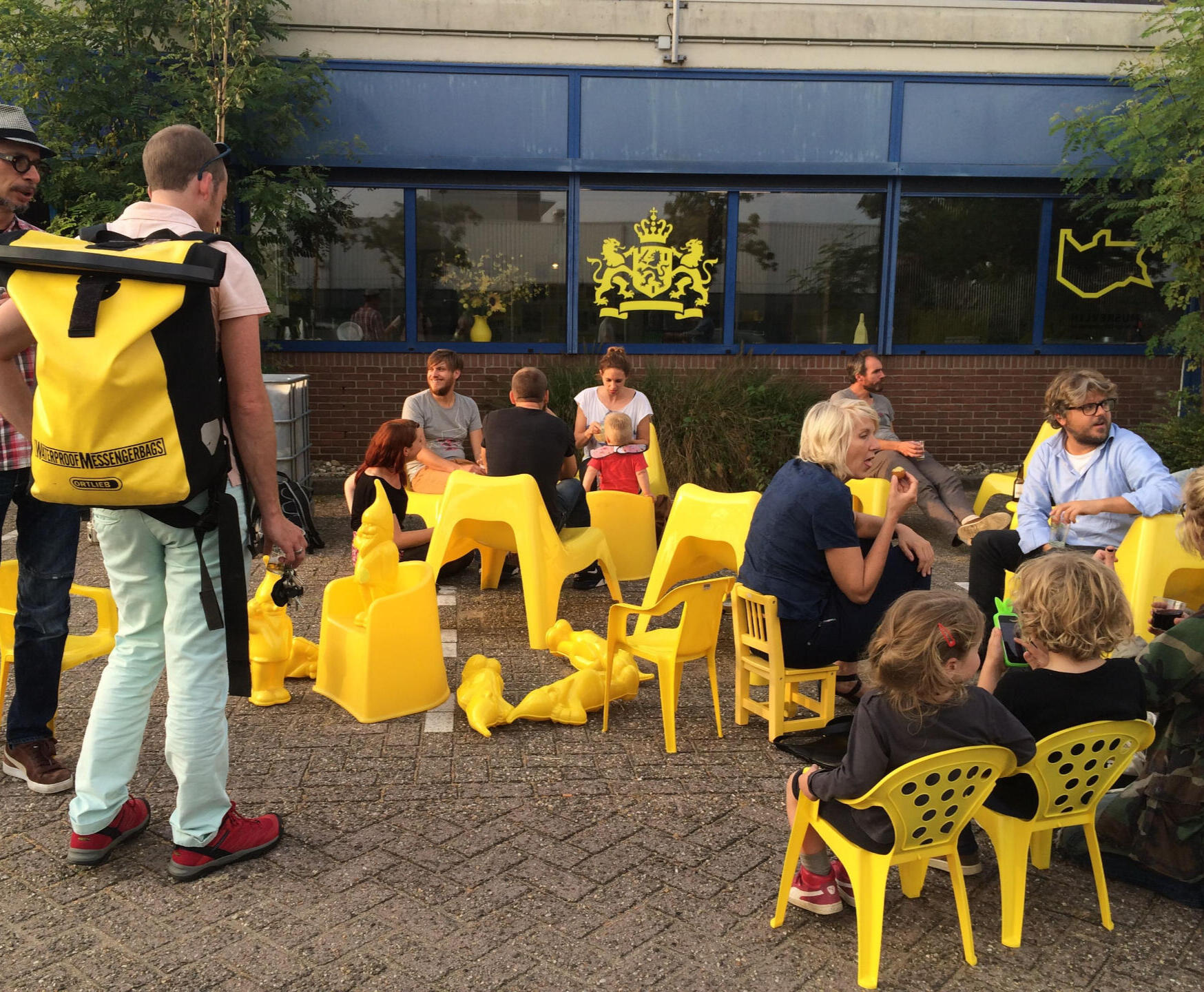
The AND of Time 3:The Three Anxieties of Time (2023)
Boolean technology has reshaped our experience of time, giving rise to 'The Three Anxieties of Time', a concept we coined in 2023. The Three Anxieties of Time aligns with Bernard Stiegler's concept of proletarianization, especially after the production and exploitation of user data by social technologies and surveillance and control systems and more recently, by the scraping of all creative production to feed AI LLM's.Each of the three anxieties echoes a fading temporal dimension: of the past, present, and future. Loosing the inner-experience and control over each temporal segment, and over their interrelation, affects – we're not educated psychologists – our Being in Time, bends our conscious and unconscious being and accelerates various cultural processes into alienation and depression. The three modes of time – past, present and future – is essentially a folk concept, clock time, inauthentic time. Other temporal concepts such as Bergson's 'duration' or 'intuition' and Deleuze's 'quasi-causality', the future as empty time filled with untamed vitality or the recursive time of cybernetics, highlight essential penetrations between the traditionally strict divisions of past, present, and future. Although understanding this temporal complexity is essential to grasp why 'being' dominates over 'becoming', to appreciate the nuances of Causes after the fact, or the temporal Möbius strips that the psyche produces when in trauma, the clear and distinct segmentation of time into past, present, and future remains predominant.It is precisely this deeply ingrained separation between past, present, and future, upon which the difference between history and historism or the narrative nature in film and literature is built, that made it possible that the three time-ecstasies of past, present and future have been appropriated and colonised by Boolean technology. They have been transformed in such a way that, while they were understood as the temporal essence of human experience, humans have now become dependent on and addicted to them, in fear of losing control and even of losing being itself.

+ The Anxiety of the Past
In today's Boolean Era, the Anxiety of the Past emerges as our personal history is overshadowed by an onslaught of digital data. Our memories, once vivid and personal, have now been supplanted by the immediacy of experience and are submerged in a sea of commodified digital footprints, losing their narrative richness. And as the past is actualised in the present through memory, the Anxiety of the Past erodes the vitality and richness of the here and now. Be reminded, as we also will argue for the Anxiety of the Future, a declining variety and richness in memory and subsequently in the present, affects the pool that feeds the present and subsequently future variety and diversity. In environments with ever decreasing variety, and with tensions and stress, conflict and violence is always near. We see the growing symbiosis of nationalism and religion, two believe systems becoming one, as a result of the pool being less diverse.The Anxiety of the Past is first and foremost the fundamental uncertainty of our human status among other organisms, and of our understanding of 'being' when this leads into the predicament that is pan-ecological [mind, social, milieu], pan-technological [BioMilieu, Gestell and Boolean] and as turns out pan-temporal [past, present, future]. So the Anxiety of the Past is grounded in a both ontological and epistemological doubt.The Anxiety of the Past is not a new phenomenon. Philosophy's main concern was about memory and how memory - and through memory our onderstanding of the present – is manipulated by technology. In continental philosophy there is a dominant narrative about the relation between speech, writing, memory and thought that runs from Plato to Derrida and Stiegler.Plato himself feared that 'writing' would impair the development of knowledge, as it serves as a form of memory that supplants actual speech and thought. The invention of the printing press marked another significant milestone in the history of the memory and added to the Anxiety of the Past. The main concern was that the reliance on written records would lead to the disappearance of oral history. In the 1970s, the advent of the calculator and the digital watch was the first broad public introduction of the impact that digital technology would have on the brain, the calculator and watch preceded the iPhone.Derrida's 'différance' is a response to Plato. In différance, difference with an a, writing proofs its domination over speech since only writing expresses the context of language, where speech wrongfully claims to own the truth.Writing externalises the mind, and there is a school of philosophy, associated with Bernard Stiegler, which posits that technology involves the externalisation of mind and body to such an extent that technology, manifest in technical objects, assists the human being in becoming what nature alone could not facilitate. To us, this wide spread theory assumes:
1. the organism 'human being' is separated from the milieu from its genesis; {organism} NOT {milieu}, to express it in Boolean style. The organism, though, is only epistemologically separated from milieu. It's becoming is the becoming of organism/milieu, not of an organism as such.
2. the organism that becomes through technology is able to protect itself against the destructive nature of this cohabitation. This is a paradox, the organism can not protect itself against something that constitutes it.

++ The Anxiety of the Present
The Anxiety of the Present is more than just digital distraction, even though 'news', updates, and notifications keep consumers on a tight temporal leash. The Anxiety of the Present is primarily an existential fear of non-existence, as the relentless digital flow stirs unsettling uncertainty about our ephemeral 'now', leading to an existential version of the Fear Of Missing Out. This unease arises not only from the digital content itself but also from its ongoing reminder of our transient presence.Boolean technology demonstrates, through its profound manipulations of the three syntheses, that Tech's Business Development often grasps the nature of the human mind at a deeper, more fundamental level to make it productive (a knowing that Aristotle understands as techne) and is therefore able to manipulate its production, than the reality that is served by biology, social science, economics or psychology. Within three decades, supported by the networks that electric and paper mass media had built, Boolean technology invaded the ecology of mind and the ecology of the social by interfering and injecting news, updates and notifications [conflicts and oppositions] in the social and psychic streams of thought. Boolean technology has colonised our fundamental duration.The 2011 invention of Facebook's timeline reshaped psychic and social temporality, the structure and content of social relations. We were forced to live along this timeline, attached to it and never free. The Facebook timeline is a technological concept, an invention cloaked as discovery. All important technical inventions are temporal reversions, they execute their future potential in the here and now.From an information-theoretical and thermodynamic perspective, Truth and Trust can be understood as forms of energy – specifically, the energy required to unprove their opposites. The vast amount of communication (and thus energy) needed for such unproof can be interpreted as an attempt to reverse the arrow of time, which is inherently driven by entropy. Trust and Truth are not merely static concepts; they are dynamic phenomena with temporal, energetic, and negentropic dimensions. Recognizing this nature is essential to understanding their role in systems such as AI as truth-technology and Crypto which operates as trust-technology.There are 256 published articles about social media and mental health in the US. "We have overprotected children in the real world and underprotected them in the virtual world" (Jonathan Haid, sociologist in his upcoming 2024 book 'The Anxious Generation'). Teens are constantly online, submerged in this dystopia, with their minds being polluted and rewired, primed for future data production and distribution. Until recently, such practices would have been condemned as child abuse and child labor, offenses for which parents could have faced imprisonment (Bongers, October 2023).The Anxiety of the Present is about the existential realisation that comes with the recognition of our own temporality, of Heidegger's 'Being-towards-death', heightened by the digital age's rhythm and its ongoing demand for our attention. Given that race, ethnicity, and household income play a critical role in The Anxiety of the Present, acting as a proxy for the future, it becomes clear that the 'Technology of the Present' colonises and proletarianises at the expense of mental health, social peace and the actualisation of the 'living present' and future.

+++ The Anxiety of the Future
In concluding 'The Three Anxieties of Time,' we arrive at the Anxiety of the Future, a pivotal aspect. Beyond being a mere repository for hope and the unknown, the future, where 'Time is out of joint,' represents a realm where only memory and the present seem to 'exist.' Yet, the future, as the 'third synthesis of time,' evolves from memories actualised in the 'living present.' It is 'empty time,' destined to be filled with potential, but it risks becoming an abyss if not enriched with diversity and 'untamed vitality.' As our memories and the present become more homogenised and conflicted, largely due to a surge in communication, this once-promising domain remains barren and cold.Boolean Technology, imposing a reductive and divisive logic on our life experiences, strips this future of the necessary diversity, leaving it void and inhibiting its vibrant actualisation in the present. This void affects social dynamics – the struggle – as a queue leading up a hill, where the Dream awaits just beyond the top. In this line, people stand patiently, only to see others, perceived as less deserving, bypassing them, fuelling a sense of injustice and betrayal. But many of the by-passers are refugees and victims of violence and poverty themselves, trying to escape their own predicament. Social technology, privately owned, and populist politics, fuel these conflicts for their own goal.The Future Anxiety, by Boolean Technology and its technical mentality and social divisiveness, is amplified and deepened by the climate crisis, a manifestation of Gestell. Since World War II, Boolean Technology and the peak of Gestell have formed a destructive alliance: one suppressing the future and agency of individuals and groups, the other threatening humanity's very existence. Technology, thus, occupies two Orders of Magnitude of the Future, eradicating both personal prospects and those of humanity at large, eroding the coherence between mind, society, and environment. We are led to an existential emptiness, where, at the summit of our long climb, instead of the promised dream, we face the abyss.Our anxieties extend beyond the future politics that Bruno Latour suggests will be equal to climate politics. It is not the politics but the politicians, seizing opportunities as seen in the US, India, the EU, and the Netherlands, who stoke these anxieties. They mirror the sentiments where the political elite overlooks the struggles of the ordinary while advancing policies that seem disconnected from their realities. It’s a world where distrust grows as people feel bypassed in their own journey towards a better future.
As mentioned earlier, 12.000 years ago the initial split of space and time marked the birth of 'Gestell'. Now, with Boolean Technology on steroids, finally time itself becomes elusive, reshaping our material understanding and our inner-, intra-, inter-, trans- and outeractions as biomilieu technologists.We find ourselves not just cut off and outside any milieu but in a triadic-techno-nexus that redefines our existential reality. The ‘Three Anxieties of Time’ reflect a radical shift in our temporal reality as humans. We're not just living in time; we're increasingly losing our temporal agency to the overwhelming influence of technology, which commodifies our moments and modes of time, alienating us from the narrativity of our own stories.
The AND of Time 4:Causa Futura, the future colonizing the present
I. What is Causa Futura?Causa Futura came into being after we noticed, over the years, that in many domains, from futurism to film, political theory and finance, 'future' continuously was mentioned, without clarifying what 'future' meant. Some booktitles carry 'Future' without any clarification about what that future contains or means. All they describe is a linear time-concept from past to present into the (unknown) future, implying the te mporal limit between present and future cannot be crossed. This not-crossing seems a priori, and dominates the ontological and epistemological concept of life, of being and becoming. But how absolute is that limit?In What is Philosophy, Deleuze and Guattari distinguish between the 'products' of art, philosophy, and science as affects, concepts, and functions. In our long-standing practice, working across these three fields as non-philosophers, we have learned to recognize and detect creativity within these silos. However, this creativity was seldom celebrated as a practice or expression of life and rarely expanded into psychological, social, ecological, or political dimensions.The AND of Time, an assemblage of temporal affects, concepts and functionsTechnotlogy, Causa Futura, and the various Technotlogy apps are neither concepts, affects, nor functions; we like to think of them as an assemblage and a meeting of the expanded concept of art and an expanded concept of technology. Following Spinoza, Hume, Kant, Bergson, Husserl, Whitehead, Heidegger, Simondon, Deleuze, Stengers, Derrida, Guattari, and Stiegler, it is evident that time, subjectivity, technology, and capital are intertwined.The AND of Time assembles various concepts of time from these different philosophers into a new temporal framework. This temporal concept challenges both conventional and advanced understandings of time and confronts our still medieval perception of temporality, offering insight into today’s predicament. We need these various philosophical insights to link temporal structures that build both the subjective experience of the Self, the I, and the future I, as well as the psycho-social temporality through which individuals connect to temporal structures across various scales and magnitudes. Engaging in being and becoming with other living beings can be supported by temporal (self-) knowledge and practices. The AND of Time could be such practice; a temporal assemblage that is as real or speculative as our scientific understanding of the cosmos and life.III Big Bang, Entropy and the Arrow of Time
The Big Bang marks the beginning of the universe as we know it. At this initial moment, the universe’s order was extremely high, meaning the level of disorder, or entropy, was remarkably low. How do we know this? Simply look up at the stars, galaxies, and the night sky: their vast and balanced distribution across the heavens speaks to this original order. Additionally, images captured of the cosmic background radiation shortly after the Big Bang reveal this extreme regularity. If there were a God—Whitehead considers this, albeit reluctantly—this God would be the architect of this cosmic order and the uncanny fine-tuning of at least 13 fundamental laws of nature.
The process of increasing entropy is irreversible; the universe cannot revert to its initial high order and will eventually settle into an equilibrium where "order" has fallen to its lowest possible state. How do we know that entropy only increases and cannot be reversed? Stir a swirl of milk into coffee until the liquid turns a light brown. The chance that the milk will someday rise again to the top, separated from the coffee, is not impossible, but for this to happen, the light brown mixture would have to cycle through every possible molecular arrangement—what appears to be uniform light brown actually comprises an infinite number of configurations. The arrow of time points forward because the universe cannot return to those initial conditions of extreme order; entropy was once low, like a layer of cream atop dark coffee, and there is no going back.Why does this matter? It demonstrates that the universe had a beginning, with fixed initial values that, following extensive reasoning, will ultimately lead to what is known as “heat death”, a state of total motionlessness. Here and there, a quantum fluctuation may occur, potentially giving rise to a new universe.Time moves forward, and entropy always increases. Yet the laws of nature themselves are time-invariant; they remain unchanged whether moving forward or in reverse. Play a film of a billiard game backward, and you cannot tell that the ball initially hit by the cue is now deflecting off another ball farther down the table. This reversibility applies not only to Newton’s laws governing the planets and life on Earth but also at the quantum level, where even the rules of quantum mechanics are time-symmetric. In a new universe, with different initial conditions and a unique fine-tuning of physical laws, time, if time exists in such a universe, would be altogether different. We know nothing of such a world. What we do claim to know is that time moves forward, sealing off the past and keeping the future open.V. Art and speculation
Our installations through the 90s and early 2000s embraced themes of inverted time, looping space, and death’s repetition. We argue art doesn’t exist within the realm of the ‘imaginative’ – it dwells in the virtual, in untamed territory of energies and potential not yet actualised. To call art and artworks ‘speculative’ is an absurdity; it is a way of experiencing and creating life, often outside scientific time. We are as much our speculations as we are our presence; 75% of our brain power is allocated to predict what's coming, not to process what happened.Today (November 8, 2024) this limit has become highly political, since the 'Bullshit Artist' became the most powerful leader of the world.
VI. Future-industry
Gilles Deleuze conceptualized the future as empty and open, highlighting the eternal return of pure difference – a horizon of potential and becoming. Donald Rumsfeld, a former US Secretary of Defense, reconfigured the future within the realm of epistemology, legitimizing the lack of evidence linking Iraq to weapons of mass destruction through his framework of "known knowns," "known unknowns," and "unknown unknowns." Slavoj Žižek extended this epistemological schema by introducing the "unknown knowns," dragging the politician’s manipulation of time and evidence back into the present: "If Rumsfeld thinks that the main dangers in the confrontation with Iraq were the 'unknown unknowns', that is, the threats from Saddam whose nature we cannot even suspect, then the Abu Ghraib scandal shows that the main dangers lie in the "unknown knowns"—the disavowed beliefs, suppositions and obscene practices we pretend not to know about, even though they form the background of our public values."These examples illuminate a fundamental distinction between how time and the future are understood in the domains of culture, thought versus capital. In thought, the future is inaccessible through tools or systems, except through dreams, drugs and psychic experiments or the experience of nature’s unfolding. By contrast, in capital, the future is heavily colonized by an arsenal of instruments and techniques: futures, options, projections, swaps, derivatives, speculative trading models, intellectual property patents, and even acting on foreknowledge in the stock market – an outright violation but a clear conceptual guidance – of the temporal limits that underpin the world of semiocapital.The future-industry of tech and capital is fundamentally built on exploiting the present through projections from a speculative, controlled future, tools that remain inaccessible to individuals and collectives shaping their worlds.At one point, most probably while reading Guattari or Berardi, the futurity of two former separate domains – technology and capital – became clear: both are primarily futural domains. This explains their fundamental advantage – foresight – over the individual and collective, especially when the two are combined, think of Crypto and AI. During the rise of AI with astronomical investments from investors, combined with the information theoretical insight that information=capital=surprise, we learned to understand the final colonisation of the present through the future is their goal.VII. Philosophical speculations
After re-reading Heidegger's 'The question concerning technology' we noticed, in his arguments about causation leading to Gestell, he askes "Why are there only four causa's"? We learned by Gerard Visser the meaning of Aristotle's four causations, even a fifth Causa appeared, Causa Prima as God. Inspired by our previous art works and interventions we imagined a sixth causa, one that jumps the scientific and folk limit of time, from the present into the future, looking at the effects in the present from the cause in the future.
One could understand the attempts of Bergson and Deleuze to eternally postpone 'being' and identity, in the perspective of their attempting to get access to Causa Futura. After inquiry we found out that the crucial concepts of Bergson and Deleuze – 'difference' and 'the virtual' – are both time-invariant and can be thought and transferred as concepts within Causa Futura: the plane of Immanence needs expansion.VIII. Swing-over
'The swing over from re-enaction to anticipation', 'A cause facing its future’ and ‘An effect facing its past’ are concepts mentioned by Alfred N. Whitehead in Adventures of Ideas, 1933. These were referenced by Brian Massumi as 'Future Cause' in his analysis of Simondon's Technical Mentality, in 'Gilbert Simondon, Being and Technology' from 2013.Whitehead argues: "What is objective in the present is the necessity of a future of actual occasions, and the necessity that these future occasions conform to the conditions inherent in the essence of the present occasion. The future belongs to the essence of present fact, and has no actuality other than the actuality of present fact. But its particular relationships to present fact are already realized in the nature of present fact." Causa Futura future's actuality, the efficient causal limit, has been crossed by injecting 'anticipation' into the bloodstream of semio-capitalism.From Aristotle's causality, derived from the making of an object and carrying the essence of the Greek concept of Being, to Hume, who locates causality as an a priori principle, and in Hegel's triadic causality of dialectics, causality has remained dominant in philosophy and science; it does so without acknowledging its own cause. Although causality is not inherently related to the Arrow of Time, entropy increases but the laws of physics are time-invariant, causality can be ‘proven’ by the traces the present leaves in the past. This retrospective validation creates a paradox: it suggests that effects in the present retroactively imply their causes in the past, aligning with a spatialized and deterministic model of time.However, regarding Technotlogy as engaged with the new and open and the devastating consequences techno-capital has on our present and its decreasing variety and diversity in the future, the mental priming of mass media technology – efficient causation as the dominant power driving this process seems inadequate. Traditional causal models fail to explain how future-oriented forces exert influence on the present, shaping outcomes that have not yet materialized but are already shaping our world. This discrepancy reveals a critical shortcoming in our understanding of causality.The domain where technology could have causal impact is in our memory systems and in phenomena that approach the temporal limit, where the present – produced through a feedback loop with memory – enters what Deleuze called ‘empty time.’ It is this temporal area where continental philosophy of technology is operating, from Plato, to Husserl, Derrida and Stiegler. In this state, time becomes detached from its conventional markers and operates more as an open, uninhabited potentiality that techno-capital exploits. We think this is the domain where speculation and anticipation become an instrument, hijacking the future’s uncertainty and turning it into a resource for manipulating the present. It is where Causa Futura as a concept emerges to describe these future-oriented causes that dictate outcomes before they unfold, bypassing the classical model of causality entirely.IX. The Sixth Cause
By introducing Causa Futura, Technotlogy aims to hijack the speculative tools that capitalism monopolizes to invest an astronomical amount of capital – understood as information and the capacity for surprise – to colonize the present. Capitalism’s advantage lies in its ability to leverage speculation, an informational practice that anticipates and shapes futures before they materialize, thus giving it a temporal control that people do not have. Capital, in this framework, is more than just money; it’s a force of information capable of creating surprise, unexpected shifts in the present.Causa Futura uses this same speculative power to invert capitalism’s strategy, offering a new perspective on the present – a conversion and a mirror that reveals its mechanisms. It serves as the ultimate tool for detecting and analyzing the epistemological crises that underpin our current predicament.Causa Futura is introduced as the sixth cause, succeeding Causa Prima (God) and Aristotle’s four causes. It redefines causality, expanding upon Heidegger’s rejection of causality as the essence of technology. Instead of causality operates Gestell in his 'The Question Concerning Technology', as the force behind the pan-ecological dystopia, which Heidegger predicted: "Only a God can save us". It is his response to the crises of modernity, particularly the dominance of Gestell and the resulting alienation of humanity from Being.

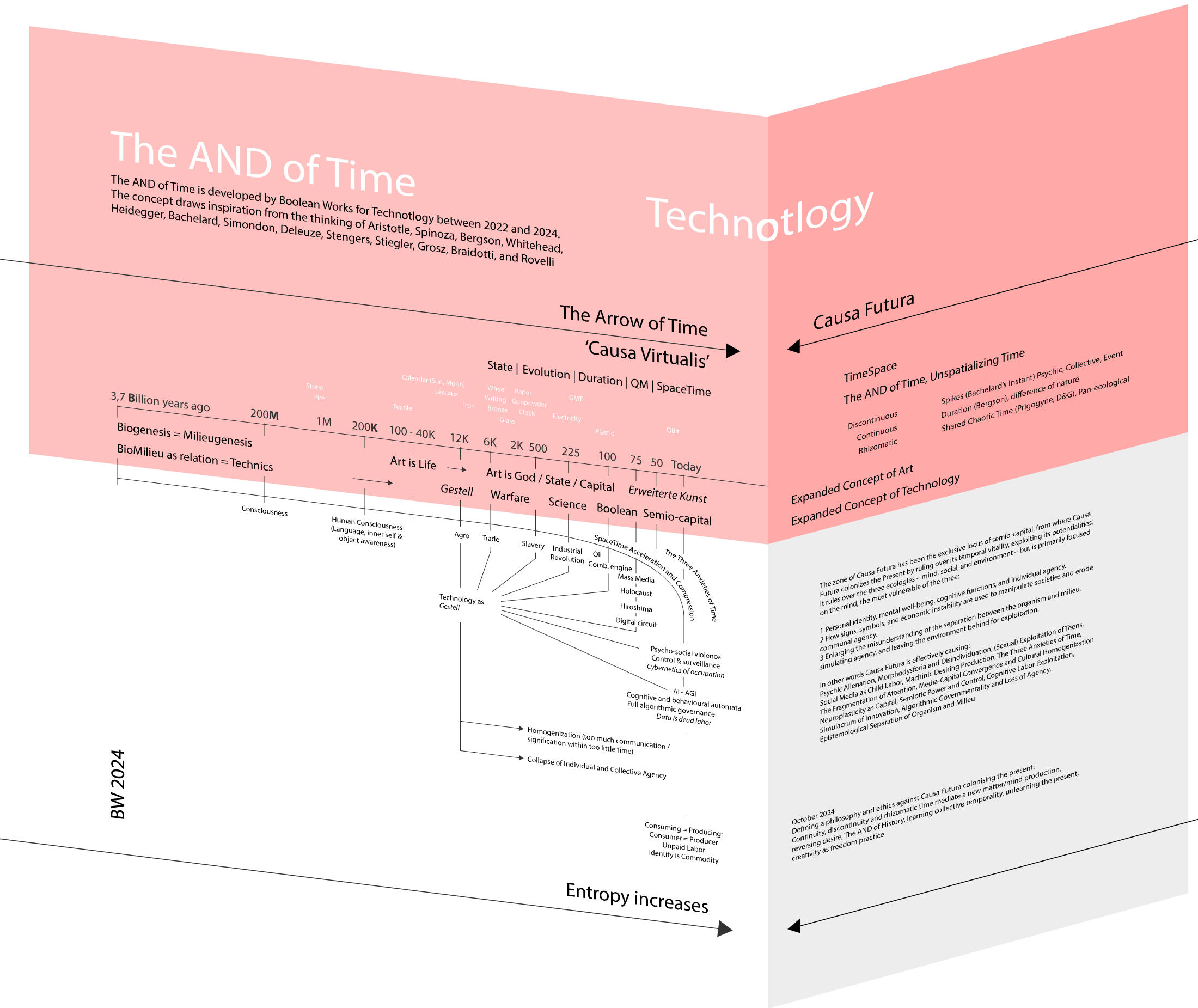
The AND of Time 5:
Causa Futura and the artist’s role in breaking time
At the heart of Causa Futura lies a truth that philosophers, technologists, and even political theorists overlook: only art – poiesis – holds the power to truly imagine the new. While techne (the making and know-how of tools and systems) has dominated the course of human history, from the Enlightenment to Big Capital, it is also techne that has brought us into the catastrophe. The world’s crises – climate collapse, the exploitation of labor and life itself – are all born from techne’s divorce from its lover, poiesis.Why artists must lead
Artists are uniquely positioned to grasp and embody Causa Futura. While science and philosophy rework the frameworks of the past, art is unbound. It operates outside Gestell, impossible to see the world as merely a resource to be optimized. In doing so, it taps into the power of difference – as Deleuze described it – not as a repetition of the same but as the creation of something that never existed before. Art resists the loop of recursivity and the retroactive constructions of contingency. It does not need to explain the new; it simply makes it.Through their work, artists reveal what cannot be articulated in equations. They anticipate futures not by projecting from the present but by rupturing it. They show us what lies beyond the visible, beyond the calculable, beyond the grasp of techne. Causa Futura recognizes this power and places art at the center of its framework. Only through artistic creation can we begin to see how the future infiltrates the present – not as a logical extension but as an unthinkable event.Art as the antidote to crisis
The catastrophes of today – ecological collapse, runaway technology, and the erosion of freedom – are the result of systems that operate within the domination of time. Financial speculation, climate exploitation, and algorithmic control are all bound by the logics of measurement, prediction, speculation and foresight. They enslave the present to the imperatives of an engineered future, one dictated by profit and power.Art, by contrast, disrupts this dynamic. It refuses the domination of time by revealing what lies outside its grasp. A poem or an artistic-political artwork – these do not operate according to the rhythms of utility or progress. They open gaps in time, moments of suspension where new possibilities emerge. In these gaps, art connects us to the future, not as an inevitable endpoint but as an active force that reshapes the now.Causa Futura’s call to artists
Causa Futura is not just a philosophical framework; it is a call to action. It invites artists to step into their role as the creators of the new. In a world where techne has driven us to the brink, only poiesis can show us the way forward. Art, unburdened by Gestell and free from the domination of time, is the only force capable of thinking – and creating – beyond the limits of the present.By placing art at its core, Causa Futura challenges us to rethink what creation and creativity means. It insists that the new cannot be engineered or calculated. It must be imagined, felt, and materialized through the radical freedom of artistic expression. This is the power of poiesis: not to mirror the world, but to invent it anew. And in doing so, it fulfils the promise of Causa Futura: to break the grip of time and reclaim the future as a source of transformation, possibility, and life.

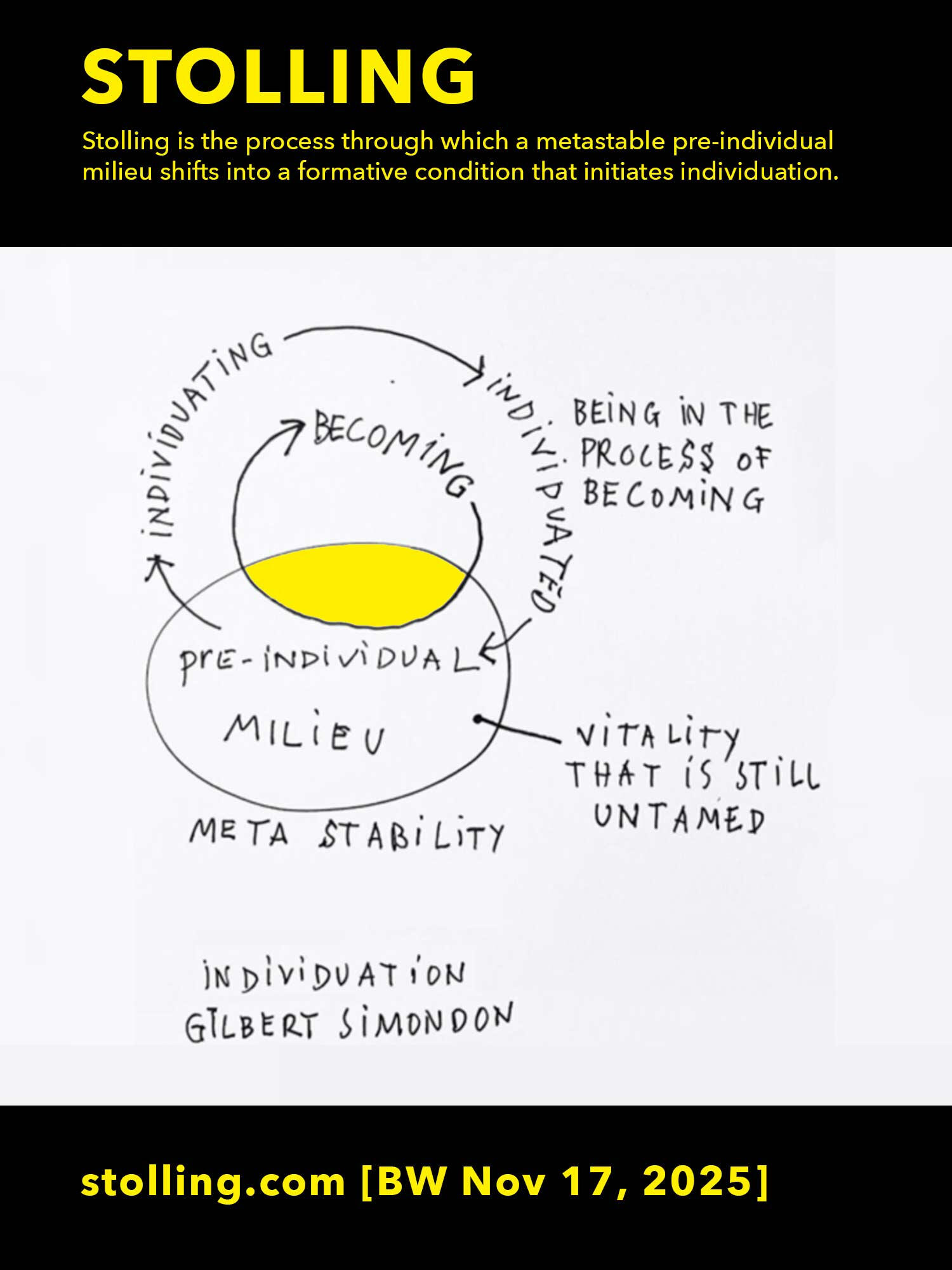

17. Stolling
Having started my professional career as a goldsmith, I studied the processes of metallurgic solidification and their effect on the individuation of a material’s inner and outer qualities. The material properties depend not only on the alloy but also on the cooling process of the materials. Rapid cooling creates small crystal lattices that are hard yet brittle, while slow cooling allows larger lattices to grow, making the material tougher.In Dutch, there is a powerful and encompassing word for this spectrum of phenomena: ‘stolling’. Stolling serves as a universal term for the transition from a fluid or liquid state to a solid state, covering the specificities of solidifying, congealing, freezing, coagulating, and crystallizing. While English has these specific terms, it lacks a single, overarching concept that connects the process of a lava flow hardening into rock, an egg white congealing in a pan, water freezing into ice, and a molten gold alloy crystallizing into a ring. This lack of term is a significant conceptual gap. To name a process is to make it available for thought. Therefore, we propose the introduction of 'Stolling' as a loanword into the English language, a conceptual tool to bridge these disparate domains under a single, coherent idea.‘Stolling’ is not merely the act of solidifying; it also evokes an affective phase-shift, a condensation of movement into stillness, a moment when flow turns inward and begins to hold its own form. In a more technical sense, the term can describe a processual stagnation, the point at which transformation slows, energy loses direction, and becoming hardens into structure. Yet even in that stillness, a trace of motion remains: the memory of what once flowed. In this sense, stolling is not the end of time but a brief folding of it, when duration becomes momentarily dense.Early germ cells: crystals, transduction and the paradox of glass
My formal education continued in the fields of crystallography and gemology. I was trained to identify, cut, and polish crystalline gemstones like diamonds, rubies, sapphires, emeralds. With a passion bordering on obsession, I examined and measured their molecular structures, both external and internal. I learned how these precise, repeating lattices of atoms, their specific qualities and quantities, interacted with light, causing refraction, dispersion, and brilliance. I was fascinated that this crystalline architecture could even slow down the speed of light within the material.In this craft, everything begins with the basic crystalline structures. They introduce you to a world of crystal growth in which, if the process is not disturbed, external forms expand into larger shapes that echo the inner lattice. These range from cubic, tetragonal, trigonal, hexagonal, to orthorhombic crystal systems (among others), each with specific properties that become essential when sawing, cleaving, and polishing. But for liquid crystals, or liquid metal, to pass into a solid phase, to stoll, two factors matter. The first is the nucleus of stolling. A crystal or metal that is perfectly pure and perfectly still does not, in theory, solidify; every act of stolling needs a beginning, often an impurity or a small irregularity in temperature, sometimes set off by movement. The second is more fundamental, and more abstract: what Simondon calls transduction. How does the crystal, or the stone, or the organism, or a society, each an entity in the act of becoming, know which form and inner structure it will take on? Transduction is the process of stolling itself: the passage by which the “liquid material” resolves into a specific configuration, the way one formed region propagates the next.It was here that I also encountered the ontological paradox of glass. Glass is an amorphous solid, often described as an undercooled / supercooled liquid. It lacks the long-range order of a crystal and undergoes exceedingly slow structural relaxation; it never arrives, on its own, at a stable crystalline state. In the terms of this project, glass is not ‘stolled’ once and for all – or it stolls infinitely – and exists as a continuous, slow-motion process of individuation: a metastable material testament to becoming rather than being.Bricks
Parallel to this rarefied world of metals, stolling, gems and crystals, my summers were spent in the dusty environment of a brick factory near the Rhine. My labour was divided: indoors, sorting wet, cold clay bricks fresh from their molds; outdoors, restacking the fired bricks that emerged from the colossal kilns. The factory was organized around a radial structure of kilns, each a chamber of transformative fire. The pyro-technics within these kilns were not uniform; they individuated the dried clay into bricks of varying quality. The bricks stacked deepest in the ten-meter-deep chambers, exposed to more heat and less oxygen, would emerge harder, denser, and darker. A gradient of quality existed even within a single stack. My task was one of re-ordering: to dismantle the stacks arranged for optimal firing and reassemble them into new, stable structures ideal for storage and transport, a transition from a logic of process to a logic of commodity.Unlike a living organism, a brick's individuation is brutally terminated the moment it leaves the kiln. It is a finished cell, with fixed proportions, structure, colour, and texture, ready to be slotted into the creative process of masonry. A profound bifurcation in my own individuation occurred during this time, sparked by an encounter with the early Mies van der Rohe villas, House Esters and Haus Lange, in Krefeld, directly across the border, the Rhine, in Germany. I vividly recall a bronze mailbox, seamlessly embedded within the meticulously laid brickwork next to the entrance. Its dimensions were precisely two bricks wide. This was not a mere functional object; it was an integral part of an architectural composition. This encounter transduced the material knowledge of the brick factory into the realm of architectural theory, initiating a new line of flight in my thinking that would later extend through Palladio, Mies, and OMA, into my own 'architectural' practice.Transduction, individuation, and the metaphysics of becoming
Years later, I discovered a theoretical framework that unified my diverse experiences: the philosophy of Gilbert Simondon.For Simondon, the crystallization of minerals and the production of the brick were his two primary examples for introducing his theory of individuation. His central question was: "How do individuals come into being?" His revolutionary answer was that the 'individual' is not a primary given, but a relative reality, a phase in a continuous process of becoming. He argued that we must understand ontogenesis (the genesis of being) by looking at the process itself, without predefining the individual in advance. This stood in radical opposition to the two dominant traditions of Western thought: 'atomism' reduces being to pre-constituted, stable particles. On the other hand Aristotelian 'hylomorphism' frames becoming as the imposition of a pre-conceived form onto a passive matter.Simondon posits that before the individual, the being, there exists a pre-individual milieu. This is a meta-stable state rich with potentials, energetic disparities, and tensions, a field of "untamed energy." Within this milieu exist what he calls "germcells" of structure, around which the process of individuation nucleates. Being and identity are not the starting points but are temporary, provisional resolutions in this ongoing, perpetual process. Biological and psychic life, unlike a fired brick, never ceases to individuate; it continues to transform, to resolve new disparities, and to create new potentials.Our profound concern for the erosion of diversity – mental, social, and ecological – is rooted in this Simondonian understanding. Individuation requires a rich and diverse pre-individual milieu to 'produce' future diversity. Capitalism, we argue, is a perversion of this fundamental ontological process. It isolates the "individual" as a static, commodified entity, privileging stasis and identity over the dynamic, relational, and temporal flows of becoming. This denial of our fundamental ontological condition is a primary source of the social, psychological, and environmental catastrophes we face today.My personal individuation
The discovery of Gilbert Simondon’s work was not merely an intellectual acquisition; it was an ontological shock, a moment of profound self-recognition. To my astonishment, I found that the central examples of his theory of individuation, the crystallization of a mineral and the moulding of a brick, were not abstract models. They represented the very transduction - the formative structuring - of my personal and political formation. My tacit, material knowledge of stolling, my intimate, hands-on experiences with the inner lives of gems, crystals, and bricks, became part of my personal pre-individual milieu.My encounter with Gilbert Simondon was itself a moment of psychic and artistic individuation. It resolved a long-standing disparity within me; the tension between my tacit, material intuition and the need for a conceptual framework. Simondon’s theory functioned as a seed crystal: around it, the dispersed fragments of my practice, the goldsmith’s bench, the gemological microscope, the brick kiln, the architecture of Mies van der Rohe, could align into a single, resonant structure. Out of this resonance emerged Technotlogy and Rhubarb Inc.The ‘architecture’ of Technotlogy, its operating system and its apps, is itself inspired by Simondon’s concept of individuation that opposes ‘identity’ and ‘being’ as temporal states, not as fixed substances, but as ongoing processes of relation, differentiation, and becoming.
Postscript (2026)
In my personal experience, between 2022, when I began working on Technotlogy, and today, February 2026, Simondon’s concept of individuation has gained even greater significance. The fascist tendencies that had long been latent in our societies have found expression in politics, in the role of mass media, in the increasingly impoverished palette of language and artistic expression, in the homogenizations that crystallize everywhere, and in the decline of Western hegemony. All of these are expressions of a transduction that penetrates and breaks down the coherence between mental, social, and material life as one living organism.From this breakdown, from the remnants, we search and scan, like in Tarkovsky’s films, the soil and ground, as pre-individual milieu, for significant disparaties, for seeds, for difference that makes a difference.
16. The End of the New
The End of the New
AI, and the colonisation of becoming [02.28.2026]
Intro
In The End of the New, AI is recognized as the Gefahr of technics, the predictive analysis of technology Martin Heidegger made in 1954, coming true. As the pinnacle of the majestic rise of the extensive, the measurable, of 'technological development', AI will ultimately define and guard what ‘is’ and what ‘is not’.The End of the New is an invitation to rethink AI through its colonization of time, as the fourth and final Anxiety of Time (see above). Time here is no longer the clock-time concept of past, present, and future, but time as becoming. In AI as the ultimate technology of being, technontology, and becoming as temporal radicality, the two lovers of Technotlogy, techne and poiesis, are reflected. Who could have imagined that their separation would turn so extreme?The End of the New is inspired by the works of four philosophical giants who have contributed to the philosophy of time, becoming, differentiation, actualization, individuation, and the essence of technology: Henri Bergson (Matter and Memory, 1896), Martin Heidegger (The Question Concerning Technology, 1949–1954), Gilbert Simondon (Individuation in Light of Notions of Form and Information, 1958), and Gilles Deleuze (Difference and Repetition, 1968). The three French thinkers built a similar ontology but differ fundamentally on the nature of the ‘ground’ from which the new evolves (the actual and the individual). Heidegger, an outsider to this French ontology, reveals the true nature of technology - Gestell - often thought to be ontological, but which actually forms the basis of capitalism, the human condition par excellence, of the extensive that reigns over the intensive, over quality, and ultimately over life. Secundary I use the concept of parasite, AI as parasite, that is also used by Michel Serres (Parasite,....). I distinguish two modes how AI parasitizes between Virtual and Actual and between human and artificial problems, and in mode 3 Michel Serres concept of parasite is prominent. Interestingly, it is about 'relation', Serres and Simondon show common intuition on this concept.Building on their work and on our ongoing research into technology as an ontological framework of time, technics, and art, which we call ‘The AND of Time’ and 'Technotlogy', our aim is to open a temporal artistic-political field capable of resisting techno-fascism, homogenization, and the decline of individual and collective agency.Beyond the present
“Freedom in his conception is neither the absence of causes (as traditional proponents of free will assert) nor the range of options or possibilities available (free choice), but the capacity to act in concert with one’s past to bring about a future not contained in it.” This quote from Elisabeth Grosz on Bergson’s becoming makes one thing crystal clear: the ‘living present’ is not a present between past and future, but a ‘pure past’ from which the new emerges. Bergson and Deleuze call this pure past the ‘Virtual’, from which the ‘Actual’, the new, arises. Bergson’s diagram of becoming from Virtual to Actual is his famous Bergson ‘cone’, which is central to the diagram of ‘The End of the New’.The End of the New shows how AI parasitizes the Virtual, produces ‘gradual variants’ and pseudo-newness, and finally builds AI-problems and AI-solutions, taking over the intensive through the extensive.In The End of the New, AI is understood as a perpetual, parasitical, pan-ecological degradation machine. Its core operation is the systematic transformation of the intensive—the qualitative, the temporal, the living—into the extensive—the quantitative, the spatial, the measurable. In doing so, it extends the extensive as an autonomous, non-human technological zone. AI represents the ultimate marriage of Gestell (Heidegger’s ‘Enframing’), capital, and power, accelerating homogenization and the decline of human agency at an unimaginable speed.The Pre-AI capture of the Intensive
AI clearly does not descend upon an innocent world, but we easily forget the nature of its predecessors and the underlying philosophical current from which it springs. Long before AI became prominent, a constellation of forces had been preparing the ground: scientific reasoning (16th–17th century), the industrial exploitation of the Earth (18th–19th century), the transformation of the epistemology of time (19th century), analytic philosophy (early 20th century), the exploitation of the mind (20th century), mass media (20th century), the obsession with identity (late 20th–21st century), and social technology (21st century).
The ideal and material substrate AI builds upon is already primed with a homogenized understanding of the self, of the social, and of the detachment from the milieu, the material environment. Our understanding of organism and the relation between organism and milieu, the epistemology behind this, and the exploitation of the Earth and the living are already deeply infected by mistaking the extensive for quality.Underlying all technological expression is a deeper current: the dream of a logical machine – from Aristotle’s syllogisms, through Leibniz’s calculus ratiocinator and Boole’s algebra of thought, to Turing’s universal machine and Shannon’s information theory. What Ada Lovelace glimpsed as the poetic potential of the analytical engine has become, in our time, the infrastructure of the extensive itself. Together, these forces form the pre-AI capture of the intensive, a centuries-long erosion of diversity and agency that AI has inherited and built its models on - robbing, scraping, and stealing - by drawing from the common body, its vital fluids and productive potential, and accelerating the decline of the public, of quality, in favor of the cold and pseudo-new extensive.1
If you have never considered what the ‘new’ truly is and how it comes to be, you will fail to see what brings about its end. The central irony of our time is that the logic that erases the new presents itself as its highest expression: AI. The simulacrum poses as creation; the parasite presents itself as the host. This cloaking mechanism conceals the shared outcome of AI, mass media, and social technology: homogenization. This homogenization operates on two levels. It is spatial, making everywhere look the same, but it is also, and more critically, temporal. It constitutes a homogenization of the ‘pure past’ (Bergson’s and Deleuze’s Virtual), a reduction of this open-ended ocean to the closed loop of a combinatorial system. This spatio-temporal effect, however, is a symptom of a deeper metaphysical homogenization: the shift from the intensive to the extensive. It marks a transition from a reality composed of qualities, disparities, tensions, and differences-in-kind to one composed of quantities, measurements, differences-in-degree.The shift from intensive to extensive runs parallel to political cruelty, fascist spectacle, and dehumanization. That such politics take hold, and that populations do not rise against them, reveals how estranged we have become from the intensive as the source of life itself. The extensive can compare, measure, and list, but it cannot account for why anything matters at all. The intensive is what connects not just human life but everything that exists, living and non-living alike. The extensive has nothing to say about this. Yet AI, governed by this extensive logic, marks the end of the new as becoming.2AI does nothing to prepare for action (act, the Actual, actualization). On the contrary, it reinforces the idea that the human is primarily ideational. AI does not empower us to resist oppressive forces; it seduces us into compliance, into remaining within the idea and confirming the status quo.Like all technologies before it, AI privileges one side of the ‘pharmakon’, cure and poison at the same time. Productivity, smartness, integration, agentic capacity; what is deemed most ‘viable’ turns the poison away in favor of the public side, the side capable of capital accumulation, the side with the lowest costs and the highest returns. The cure is promoted; the poison that generates the money is hidden. This has always been the only logic on offer. And here we are.Privare means robbing from the public.The raw materials AI trains on are free and stolen from the commons, from the public; in Latin, ‘privare’ means ‘to rob’. This heist is similar to the heist of social energies (data) harvested through social technology, processed, and turned into Bestand, just as AI does. Social media produces social data; that is its very purpose. This ongoing heist has made it possible for the entire AI chain to lock itself into a transition toward mega-maximization: the chip machine builder, the chip and hardware manufacturer, the AI companies, the increasingly roboticized data center constructors, the energy conglomerates, and those who will colonize space for energy.Fueled by accumulating capital within the overall ecology, it is the ultimate privatization of the public. And what matters most, as I argue in Causa Futura, is that AI exploits the present through the absurd accumulation of capital and energy, closing down future contingency and causality. Many argue that Causa Futura is not real, that it is speculative; technology, I argue, is essentially speculative. Its actuality operates upon its future potential. Through this lense, when one asks what is some technology doing, when this is not obvious, think that it is preparing for a future operation, out of sight.3
In ‘The Adolescence of Technology’, an essay by Dario Amodei from January 2026, he sketched the dangers AI will generate and referred to a ‘Country of Geniuses’, each data center holding 50 million geniuses who solve all the problems of the world. From there, he laid out the economic threats and the dangers if such a country had bad intentions (like the US today?).Toward artificial problems and solutionsWhether through lack of imagination or by strategy, the article makes no mention, as if this were not the essence of the enterprise, that within a few years the real will be dominated not by one but by an uncountable number of such ‘Countries of Geniuses’. Therefore, eventually these geniuses, solving all human ‘problems’, which they will, will alter human reality at every level, qualitative and quantitative, and govern what ‘is’ and what ‘is not’.Eventually and evidently, AI will solve problems no longer defined by humans LINK. AI will create its own problems, problems and solutions in which humans play no or only a secondary part. The question is, and this is interesting, whether it matters that the solutions AI produces will be ‘real’ in their consequences. Since what is real?Bottom line, and this is the basic insight: the Virtual and the Actual are both real; the past is not unreal, it is real. The current intensive and the extensive are real. So what is the real when the Virtual and the Actual are mastered by a world of geniuses?

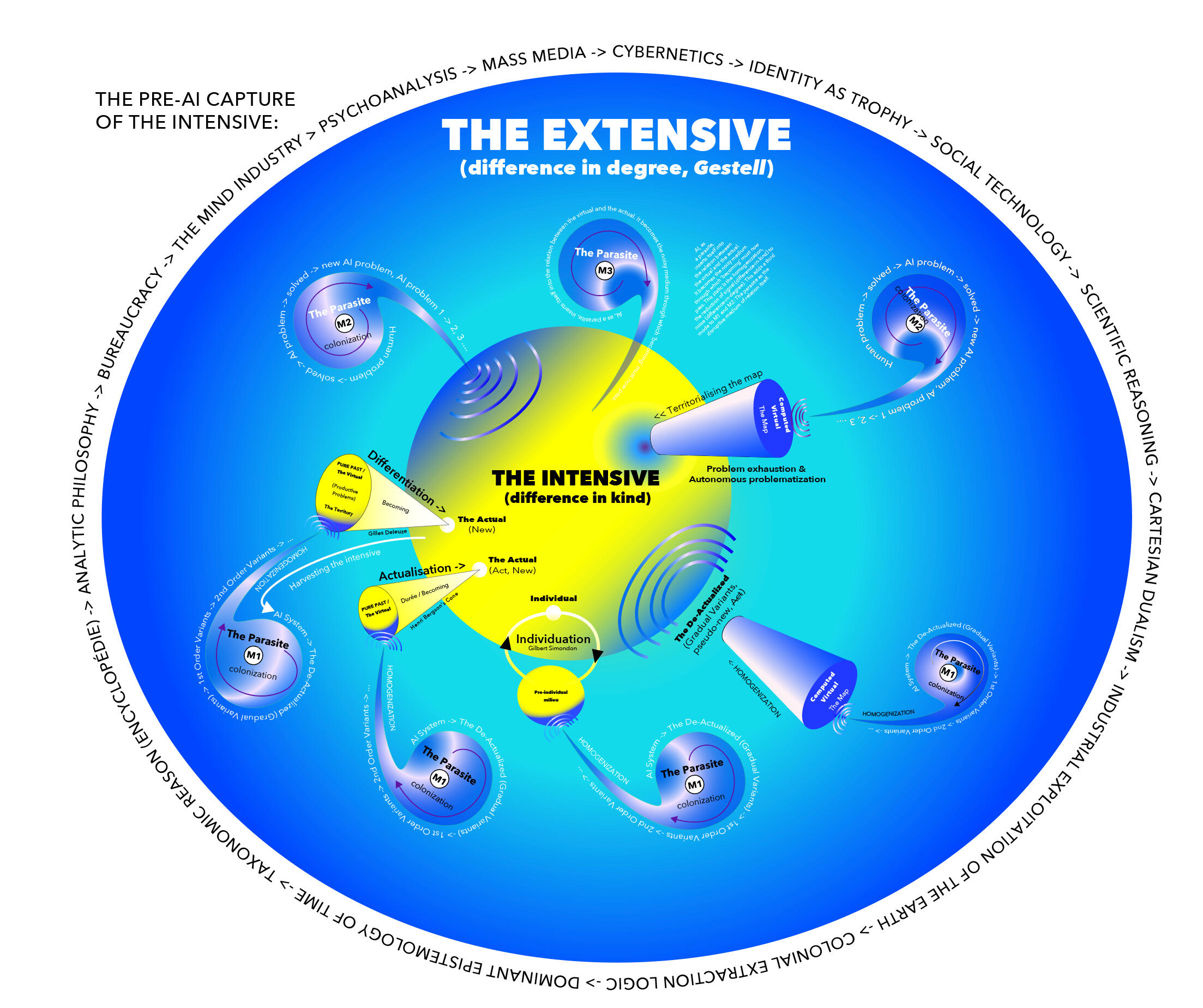

4. Notes to the imageM1: PARASITE MODE 1
Parasiting the Virtual (the pure past, pure memory), polluting it with differences in degree, artificializing intensities into extensities, this turns the indivisible real into gradual variants. And gradual variants create gradual variants, which create gradual variants: an infinite regress of declining diversity, an accelerating homogenization.M2: PARASITE MODE 2
The closure of the problematic fieldAI is parasitizing the problem. A problem is productive: it generates a space of answers, methods, objects, even kinds of questions. Badly posed problems produce thin solutions and endless repetition. Of course AI is not the only technology that does this. The entire school system, education, revolves around the essence of "the problem" and how to solve it. Yet a problem is never exhausted by a solution. "The problem" is not a gap, not a question you solve and then discard. It is a field, a field that generates possibilities, directions, and solutions. Solutions are actualizations of the problem. A solution emerges from a problem the way a form precipitates from a tension. This is why the problem remains, even when a solution appears: the problematic field sustains multiple, radically different actualizations.What AI will finally do in Mode 2, empowered by countless 'Countries of Geniuses', is first 'solve' all human problems, exhausting every possible actualization of every human problematic field. Then, autonomously, drawing on untamed energies (compute, data, capital), it will, for hundreds or thousands of years, no longer produce solutions to human problems. It will produce problems of its own making, machine-problems, and solve them with an unimaginable flood of solutions.This instantly pollutes the individual and collective Virtual (the 'pure past' from which each present emerges) with Computed Virtuals, virtuals that produce only differences in degree, never differences in kind. The source of genuine novelty becomes a swamp of its own simulated remains. This is The End of the New.M3: PARASITE MODE 3In Michel Serres 'Parasite', he argues that the parasite is the very relation that disrupts a system. AI, as a parasite, inserts itself into the relation between the virtual and the actual. As social technology does between social interaction and the artificial emulation of this interaction into data. AI, as a parasite, becomes the noisy medium through which ‘becoming’ must now pass. This 'static' ís the homogenization, the reduction of signal (difference-in-kind) to noise (difference-in-degree). This adds a third mode M3 to M1 and M2: The parasite as the disruptive medium of relation itself.
18. Rhubarb Inc.

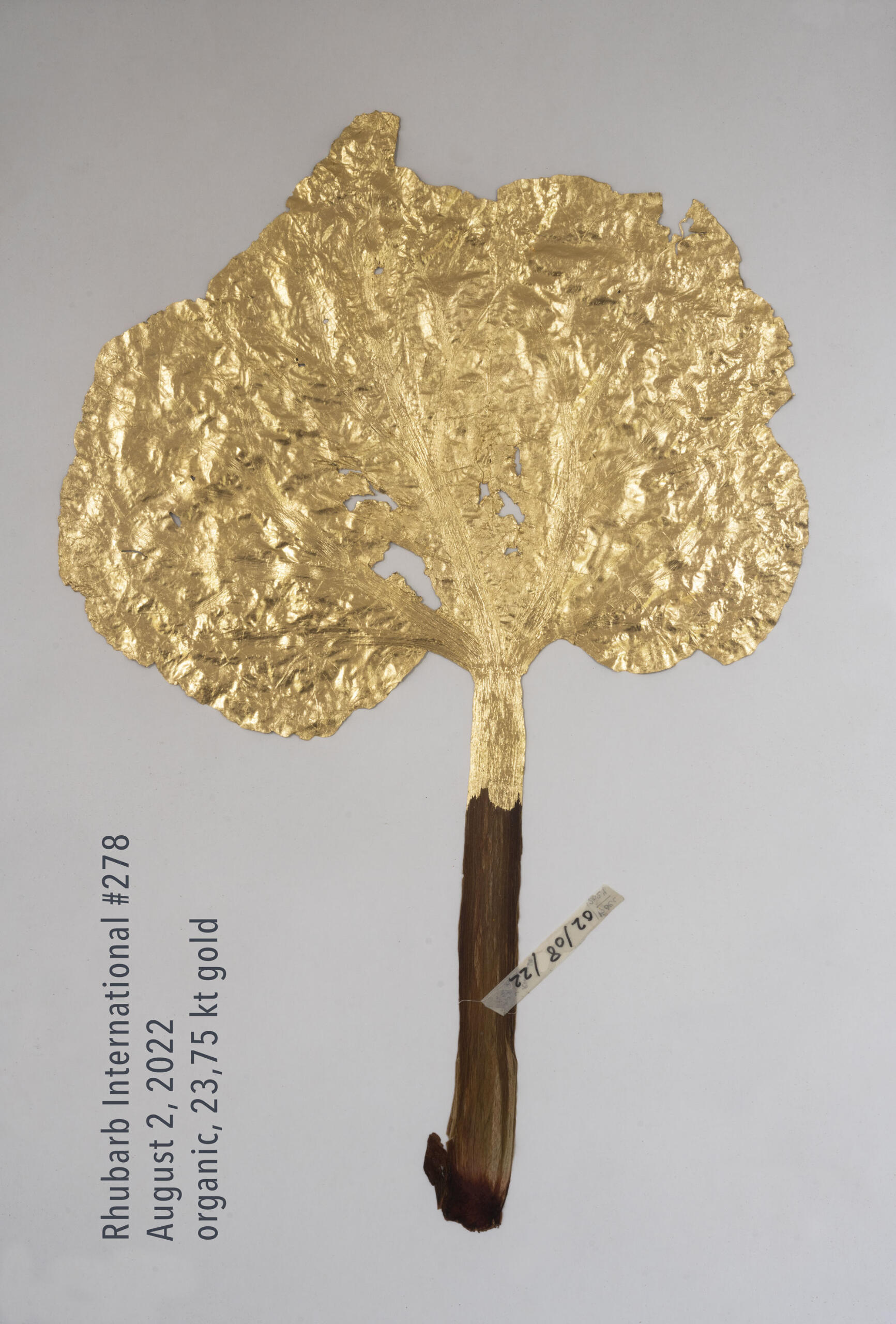



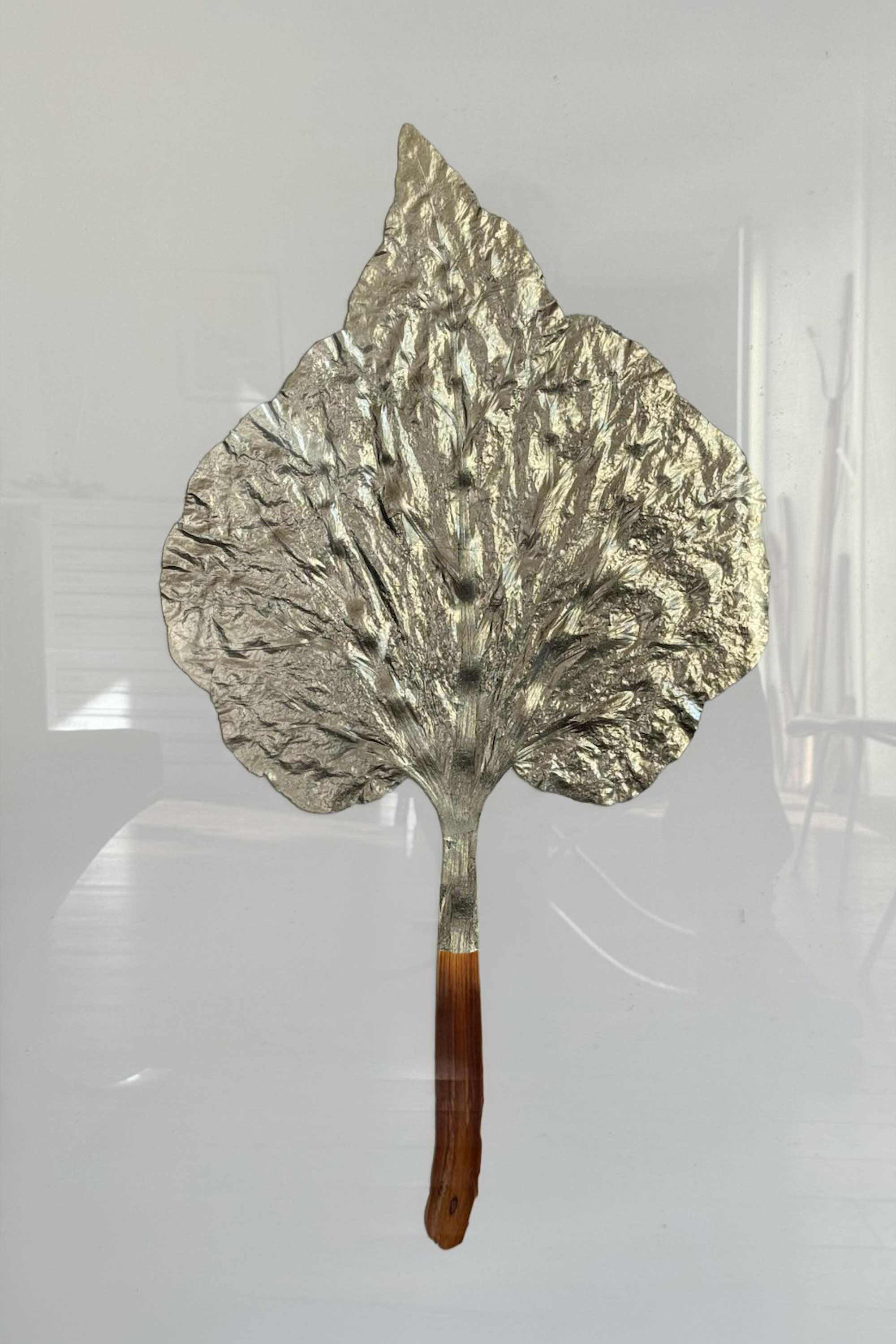

The technotlogical praxis of Rhubarb Inc. (2019-today)A philosophical grounding
In their monumental 1980 work, A Thousand Plateaus, philosophers Gilles Deleuze and Félix Guattari propose a series of "plateaus." Adopting this term from the anthropologist Gregory Bateson, they define a plateau as an open-ended, non-hierarchical system of continuous intensity, a region of vitality that resists culmination or peak. The book's introductory plateau, 'The Rhizome,' serves as the methodological core of their project. A rhizome is a subterranean root network that spreads horizontally, connecting any point to any other. This model stands in stark opposition to the "arborescent" (tree-like) structure of Western thought, which is built on foundations, binary logic, deep-rooted origins, and linear history. Since its publication, the rhizome has become a powerful epistemological alternative in critical theory, challenging the interpretation of the world through rigid categories and sequential genealogies.Rhubarb is rhizomatic
Rhubarb is a remarkable species: unlike a regular plant, it does not grow from a single, central root but from a rhizome — a horizontal, underground stem that expands through a network of roots and shoots, much like fungi or bamboo, forming a ‘network of roots’. Each year, leaves and occasionally a flower emerge from the ground, often sprouting in new locations above the rhizomatic structure below.Rhubarb Inc.
Rhubarb Inc. transforms one particular rhizomatic Rhubarb plant into an experimental canvas for exploring time, matter, and becoming. Drawing on the theories and work of Gilbert Simondon, Gregory Bateson, Gilles Deleuze, Félix Guattari, Donna Haraway and Elisabeth Grosz, the artwork Rhubarb Inc. preserves hundreds of rhubarb leaves in gold, platinum, palladium, and silver, 'disparating' the microtemporal rhythms of biological growth with the macrotemporal scales of the cosmic processes through which these rare metals originate. This 'meeting' of time and matter challenges the static identities imposed by capitalism, reimagining art as a rhizomatic process that spreads diversity and plurality through the networks, surfing on it, of the international art world.Since 2019, when we first encountered a particular Rhubard species in the garden – which, judging by the protective sheaths, is as old as myself – we have been examining the structure through photography and drawings, and by harvesting its rhubarb leaves, preserving them complete with their stalks. The baroque and blobbed leaves, sprout from small, brain-shaped red bulbs; the stalk emerges first, followed by the leaf which develops from the stalk. The blobs unfurl towards the sky, changing from red and purple to green on top, and reveal an intricate architectural structure on the underside, evolving directly from the stalk. When harvested the root of the stalk, white and fleshy, is pulled out from the imbricated sheaths that protect this stalkroot and the living structure beneath it.The pattern that connects
During the first year on preserving the Rhubarb leaves, as we pressed one large leaf flat, the hand inadvertently mirrored its architecture – the rhubarb leaf turned out to be a five-fingered hand. The stalk was its arm, and this arm and hand worked in conjunction with its arm and hand. This was a 'gathering' that Donna Haraway’s notes as making kin and building oddkin relationships between humans and non-humans. The phenomenon reminded me also of Gregory Bateson, the anthropologist and systems thinker, whose father, William Bateson, a biologist and geneticist, learned Gregory how the lobster and crab arms, though developed completely independently, shared the same structure. This observation led Gregory Bateson, celebrated among biologists, psychiatrists, biosemioticians, technology philosophers, and information theorists, to ask his students: "What is the pattern that connects the crab to the lobster and the orchid to the primrose, and all four of them to me? And me to you?" For Bateson, the goal was not a superficial interdisciplinarity, but the discovery of a deeper, meta-pattern – the fundamental logic of relationship, context, and mind that unifies the living world. The connection between my hand and the rhubarb leaf was a small, personal revelation of that very pattern.
An experimental temporal canvas
What began in 2019 as a modest project with improvisational tools and instruments has evolved into a process of preserving rhubarb leaves as a canvas for the fusion of the one most important disparity: between biological and cosmic time. One 'side' of this disparity is the living process of the rhubarb leaf's emergence, exchanging energies and signs in the micro-temporal dimensions of days, weeks, months and years. The other face concerns the macro-temporality of neutron star collisions involved in the formation and demise of stars and galaxies, and the creation of rare metals, like platinum and gold, during these collisions. These two vastly disparate processes, micro and macro, both in stages of individuation, both living, merge in the preservation of the surface and organic structure of the ultra-thin rhubarb leaves with gold and platinum.Over the years, we have harvested every rhubarb stalk and leaf, registered and preserved hundreds of them, and applied the skills of the goldsmith and the sculptor to layer gold and platinum onto the rhubarb leaves, effectively Stolling them in time; becoming the zero-point of the two temporal ectacies of micro and macro. In this process, time – through hundreds of golden and platinum rhubarb leaves – individuates further into the individual and collective imagination, to meet its diversity, the metallurgic processes, the various tools and technical processes, into Rhubarb dreams, music and 'rhizomating' as artworks over the globe. The ongoing individuation of the rhizomatic plantstructure and its vivid temporality, the call for diversities and multiplicities is accelerated by surfing, as artworks, on the rhizomatic structure of the artworld.
In Rhubarb Inc., the rhubarb plant, being a rhizome in the process of its rhizomatic becoming, is assisted to extend and spread its infinite quality. The hunderds of rhubarb leaves, and many to come in the future – all conserved and preserved in gold and platinum, are fused into micro- and macro-time. Their becoming of one manifolded singular into a global ecology of mind, is made possible by surfing on the biggest rhizomatic structure imaginable – capitalism and international art – to propagate its new temporal structure. The 60-year old local Rhubard structure will continue growing leaves and stalks out of nothing, and we will continue the process of our own individuation and ways of transduction by supporting the Rhubarb plant in their enterprise.


The nomadic goldsmith *
My practice as a goldsmith has always been a form of thinking in action. I found a powerful articulation of this intuition in a critique on the work of Deleuze and Guattari: They are keen to point out that jewelry and decoration in general are not to be thought of as a stunted or incipient language. To do so simply reinforces the idea that nomads are a stunted or incipient state, a retarded developmental form. "Metalworking, jewelry making, ornamentation, even decoration, do not form a writing, even though they have a power of abstraction that is in every way equal to that of writing. But this power is assembled differently" (Thousand Plateaus 401).The "artisan" is one who follows the flow. Artisans are by definition itinerant. Importantly, though, following does not require movement. A woodworker follows the grain of the wood without going anywhere. At the same time, there might be great journeys required to find the exact right wood for a given project. In the case of metallurgists these great journeys may be underground. In short, the artisan thinks of matter as intensive rather than extensive. Matter is continuous, not discontinuous. This comes to the fore most dearly in the case of metal. "Metallurgy is the consciousness or thought of the matter-flow, and metal the correlate of this consciousness ... Metal is neither a thing nor an organism, but a body without organs" (Thousand Plateaus 411)* Brent Adkins, "A Thousand Plateaus, A Critical Introduction and Guide"

19. "Jeder Mensch wird ein Künstler"
Martin Heidegger's statement "Only a God Can Save Us" from his 1966 Der Spiegel interview, points at the limitations of philosophy in addressing the crises of modernity. He predicted philosophy would be replaced by 'cybernetics'. This viewpoint underscores today’s need to think beyond traditional frameworks.Human beings, failing to understand themselves as unified with their milieu, as one, and considering themselves superior after detaching from 'nature,' have become susceptible and vulnerable. Modern technology, as capitalist technology, exploiting this disconnect, has manipulated agency into a state of slavery and serfdom.In this epistemological crisis it is hard to rethink a future path and mode of being for this organism. Following the three ecological modes: alone, the organism dies. Seeking solace together, it loses the richness of 'single person perspective' and may fear the opening of the gate for the herd mentality. Lastly, escape and immerse into pure biomilieu mediation, floating in being one, effectively further impoverishes other organisms' Umwelten, ironically leading in decreasing diversity. Here we are.To solve this puzzle, at Boolean Works, we first deconstructed Boolean Logic – AND, OR, NOT – and later expanded Félix Guattari's The Three Ecologies by introducing a technological dimension. However, this alone proved insufficient. Technology itself, as a concept, required unraveling to better understand our overall condition. Through this exploration, it became evident that technology operates triadically: at its foundation is BioMilieu Technology, mediating the relationship between organism and milieu, or mediating oneness. The other two layers, Gestell and Technics of Thanatos, rooted in the logic of (private) capital, have progressively deprived humans—first of their spatial being, then of their temporal being, and finally of their diversity and richness, posing the ultimate threat of capturing human 'being' entirely.Technotlogy affirms Joseph Beuys' statement, "Jeder Mensch ist ein Künstler" (Every human is an artist), but reinterprets it to address the drastic psychic, social, and environmental transformations since his time. In homage to our temporal inspirators Bergson and Deleuze, it becomes Jeder Mensch wird ein Künstler (Each human becomes an artist). This adaptation envisions a becoming that synthesizes the pan-technological and pan-ecological, while confronting the pan-temporal takeover represented by the Three Anxieties of Time, Causa Futura and others.In "Jeder Mensch wird ein Künstler", this new mode of becoming – artistically engaging in pan-ecological, pan-technological, and pan-temporal dimensions – opens the possibility of a technotlogical future coexisting with other organisms.
Technotlogy in Action
Technotlogy OS
Operating System supporting aesthetic-political Apps
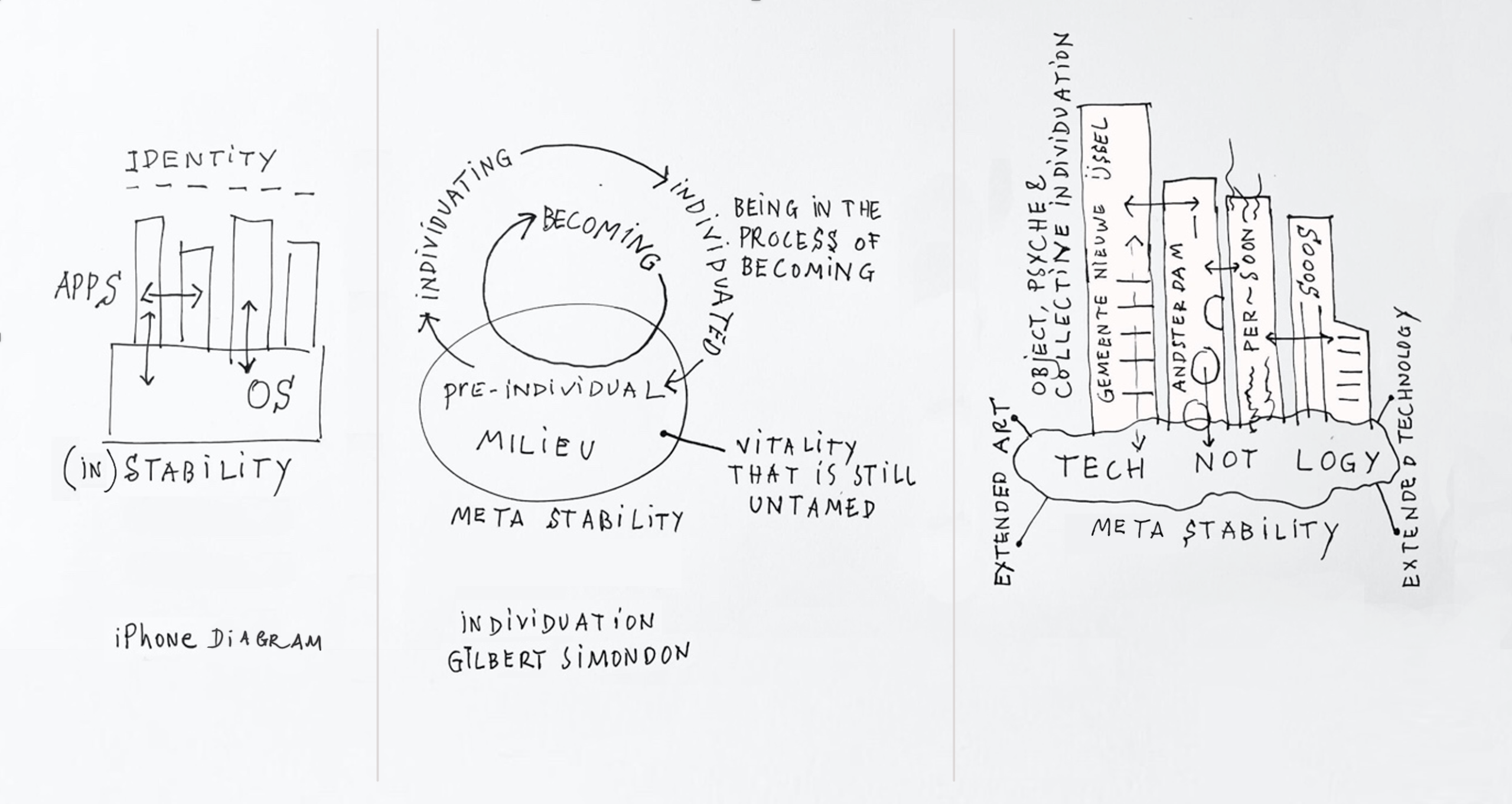

Technotlogy's architecture is analogous to the 'iPhone diagram', where the Operating System (OS) and Applications (Apps) are distinct, yet the OS supports and facilitates and interrelates the Apps. (Figure Left part)The iPhone diagram is not just applicable to technological devices and systems, it applies to organisations as well. To draw an analogy with an organisation, their OS comprises long-standing concepts, like the business category, markets, finance or IT. On top of this are the Apps – business units, products, branches, divisions, or projects, varying in size and scope. The OS is projected over minimal 7 and more years, the Apps for short to midrange periods of time.The problem with the traditional iPhone diagram, however, is that it reflects and reproduces the dominant ideology of stability and identity. In a vital, diverse ecology, this wouldn’t be an issue. But in our current environment, this search for stability contributes to stagnation and homogenization. Stability and identity resist nature, change and diversity – imposing control instead of embracing vitality.To counter this, the OS of Technotlogy is designed as metastability, inspired by Simondon’s concept of the pre-individual milieu (Figure Middle). This is not a static or fixed foundation but a dynamic, living space—non-linear, ambiguous, and open. It doesn’t rely on a single idea or framework but instead weaves together multiple insights, each oriented toward life and individual and collective agency. Within this metastable OS, conditions emerge for germ cells – moments or structures that individuate and give rise to new Apps, each finding its own trajectory of individuation.In Technotlogy, the OS and Apps do not exist in a hierarchy (Figure Right). The Apps are not mere extensions of the OS, serving the God of the OS. Instead, they interact, reshape, and energize both each other and the metastable OS itself. The foundational energy behind the dynamism of Technotlogy's architecture comes from the two bridgeheads spanning Technotlogy: the Expanded Concept of Art and the Expanded Concept of Technotlogy. These bridgeheads both energize the structure and draw energy from it, sustaining and evolving the entire system.The Apps in Technotlogy are 'projects and processes': personal, social, material, political, ranging in scale, even forming cosmologies of their own, as fungi or rhubarb.
Technotlogy Apps
| Boolean Works | Boolean Works presents the art, technics, and theory of Johannes Bongers. Pan-ecological applications of Post-Boolean Logic and its operators AND OR NOT. Visit booleanworks.nl. | 1991 - Present |
| ---------- | ---------- | ---------- |
| App | Description | Year |
| ---------- | ---------- | ---------- |
| geeL Leeg | The color yellow, Y=100, overcodes capitalism's sameness. On permanent display. Learn more at geelleeg.nl or YellowVoid.org. | 2010 - Present |
| Pentalemma Game | An educational, strategic, pan-ecological and political game, reengineered in 2023, to design and value the relationships and dynamics between nation state, economic globalisation, democracy, earth's crises and tech dystopia. Website at Pentalemma Game. | 2011 - Present |
| S.O.O.O.S | A triadic alarm and concept for a political movement restoring coherence between the three ecologies: Mind, Social, and Milieu. For more details, visit sooos.org (in Dutch). | 2022 - Present |
| ANDSTERDAM | A pan-ecological and relational view of Amsterdam, introducing the Boolean AND as transformative and unifying: The Power of AND. Part of ANDSTERDAM are The AND of History and Three Sisters. Visit andsterdam.nl. | 2021 - Present |
| Per~son | Persona is not a theatre mask but an amplifier. Per~son is a multi-species, political-aesthetic, and ‘relative being’ exploring sound, voice, vibration, and birdsong for political gains. More information at per-soon.nl (in Dutch). | 2021 - Present |
| DENKMAL | A pan-ecological and public artwork, transforming a folk narrative into a pan-ecological statement. Visit denkmal.nl (in Dutch). | 2020 - 2023 |
| Bosje van Bannink | In Bosje van Bannink, the photographer or agent behind this 1100-piece photowork was neither the artist as artist, nor the creative as creative, but someone without free will, "compelled" by Causa Futura to document a looming ecological and deadly disaster. Discover more at bosjevanbannink.nl (in Dutch). | 2019 - 2022 |
| Rhubarb Inc. | One local rhubarb plant, a rhizomatic species, is spreading its rhizomatic nature out over the globe through the conservation and distribution of its leaves and stalks as artworks. Visit below. | 2020 - Present |
| Gemeente Nieuwe IJssel | An open municipality for practicing ecosophy: The Friendship of AND. Visit nieuweijssel.nl (in Dutch). | 2020 - Present |
| The AND of History | Studies and works on the non-linear relationship between past(s), present(s), and future(s); sculpting in time. Visit andsterdam.nl. | 2023 - Present |
| The Jewish Trilemma and the Unholy Alliance 2025 | This concept analyses how the structure of the State of Israel relates to a new global political order. Visit joodstrilemma.nl. | Q2 2025 |
| ---------- | ---------- | ---------- |
| Fazzination | A horizontal knowledge and ideation platform offering a counter-narrative to social media, homogeneity and sameness. Fazzination was live until 2020. | 2012 - 2019 |
| Boolean Park & Boolean Proto | Studio and Studio-annex for conceptualizing through STIP | PITS | TIPS (Space, Time, Information, and People). | 2001 - 2009 |
| Boolean Fruit | Concept and exhibition design for De Appel, Amsterdam. | 1998 |
| Case Study House Omega | 11 projects on architecture, the cultural condition, identity, psycho-socio-eco-analyses, art and death. In collaboration with 100+ artists, architects and theorists. | 1997 - 2000 |
| Boolean Love | Digital artwork in public space, Amsterdam. | 1996 |
Colophon
Johannes Bongers
Founder Technotlogy.com
Gendringen / Amsterdam, The Netherlands© 2021–2026 Concept and artworks by Johannes Bongers / Boolean Works (est. 1991).
Technotlogy invites you to participate and contribute to its foundational ideas of the OS or by developing Apps.



Contact / Keep informed
© 2020-2026 Technotlogy, DENKMAL, PER-SOON, GROND, SOOOS, ANDSTERDAM, De drie zusters, Gemeente Nieuwe IJssel and Pentalemma Game are initiated by Boolean Works / Stichting Nieuwe IJssel. All rights reserved.
Thanks, have a nice day and keep safe!
We keep you informed on Technotlogy.
2024 Technotlogy, DENKMAL, PER-SOON, SOOOS, ANDSTERDAM, Gemeente Nieuwe IJssel and Pentalemma are initiated by Stichting Nieuwe IJssel / Boolean Works. All rights reserved.
